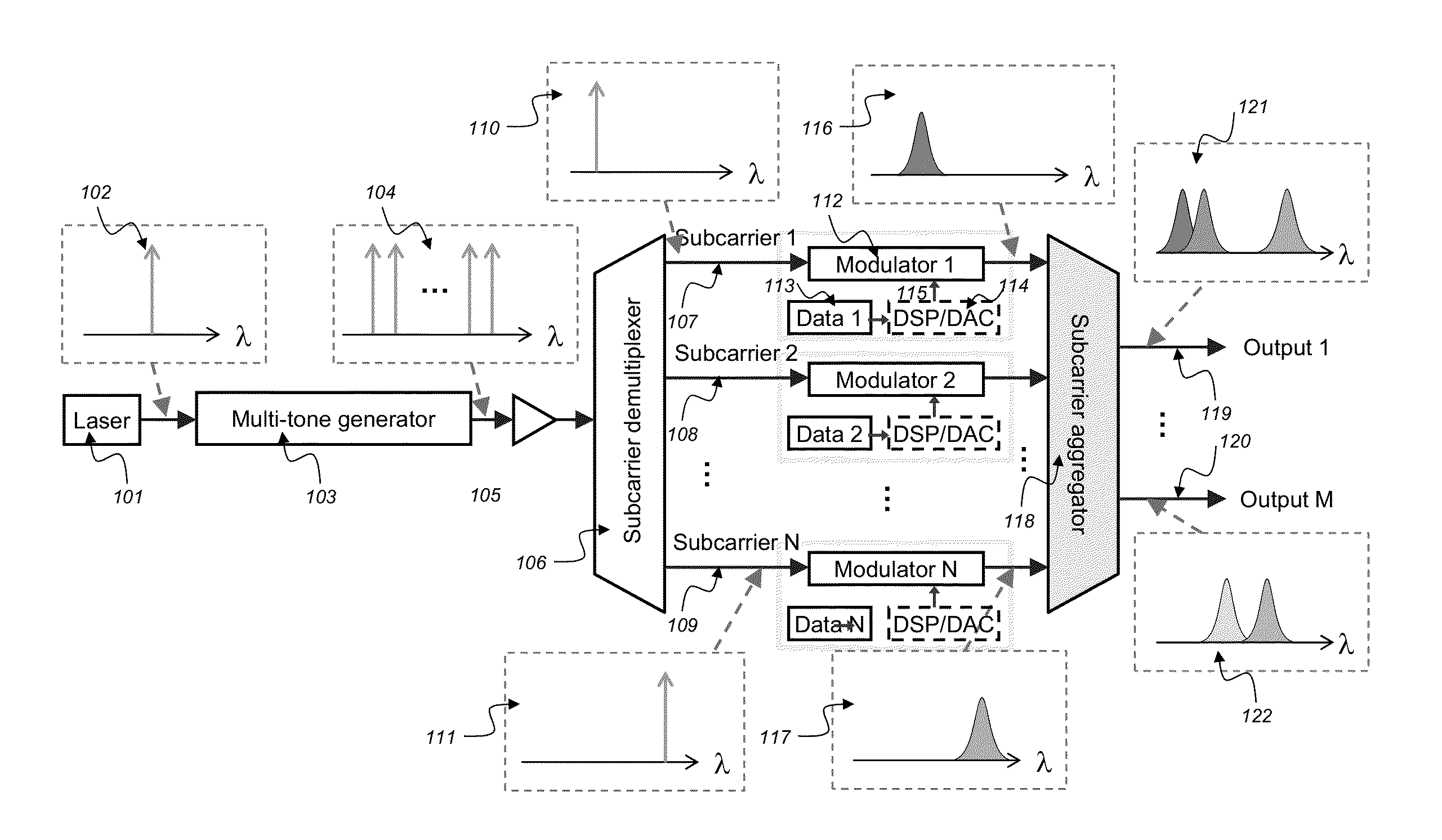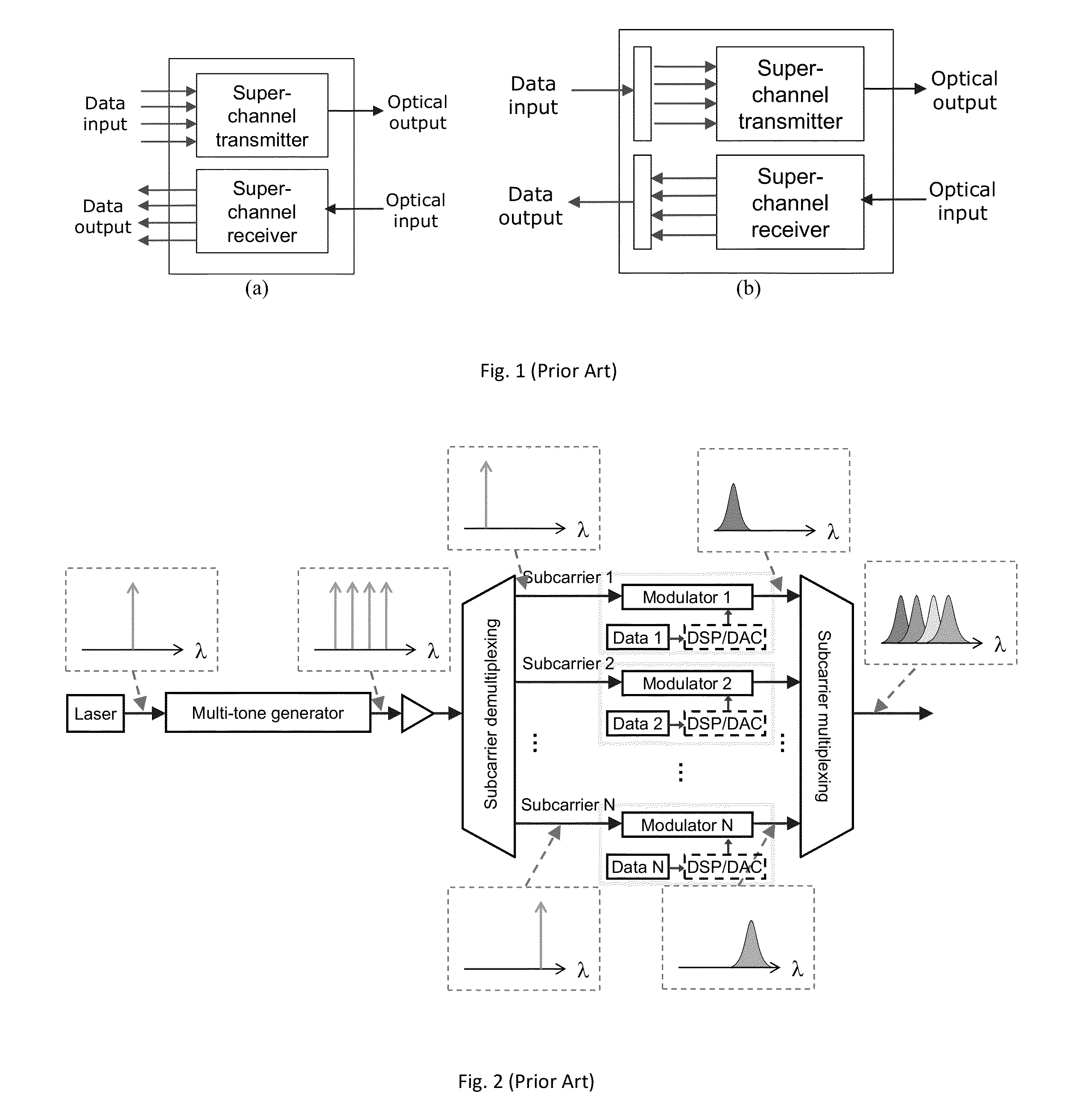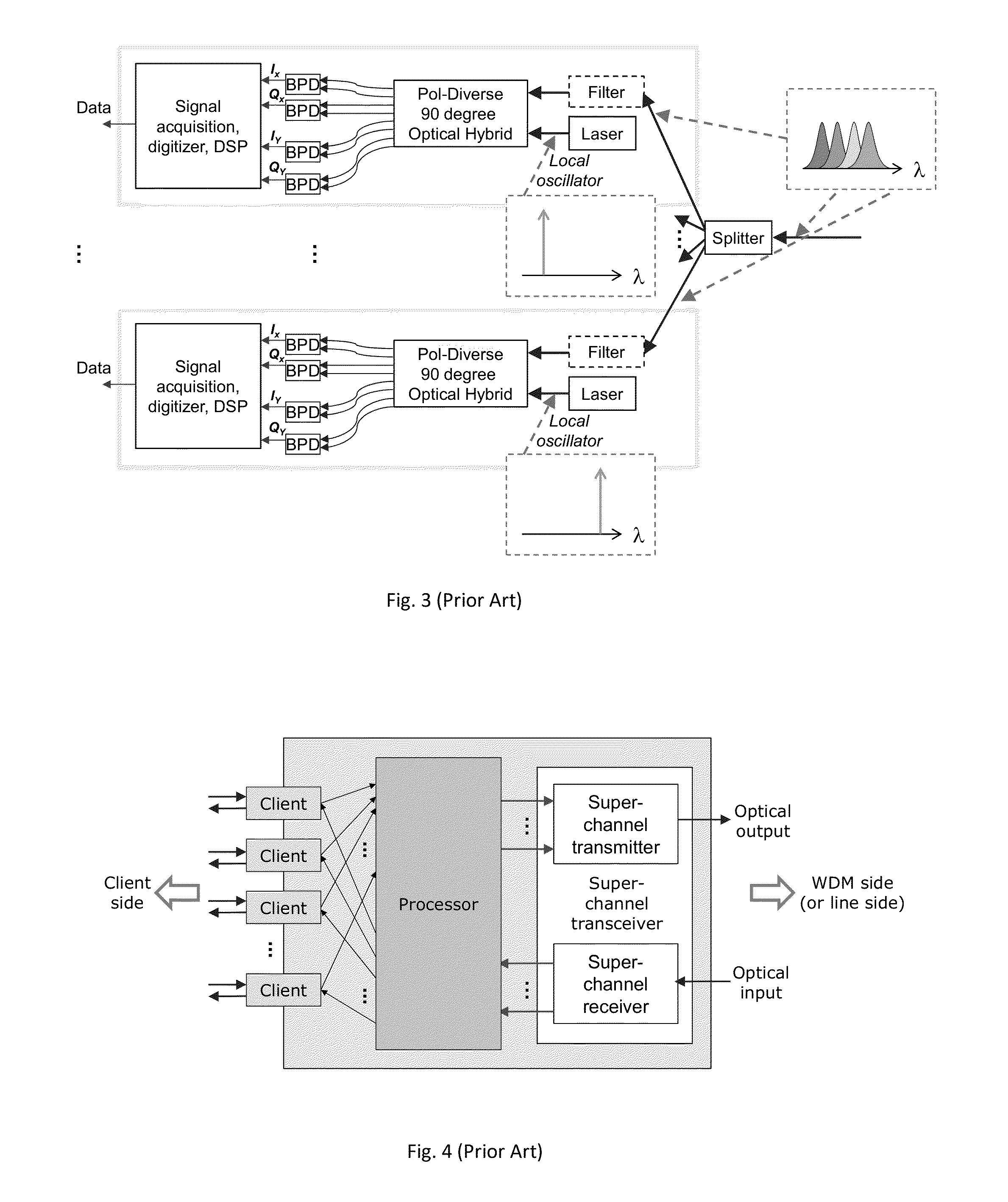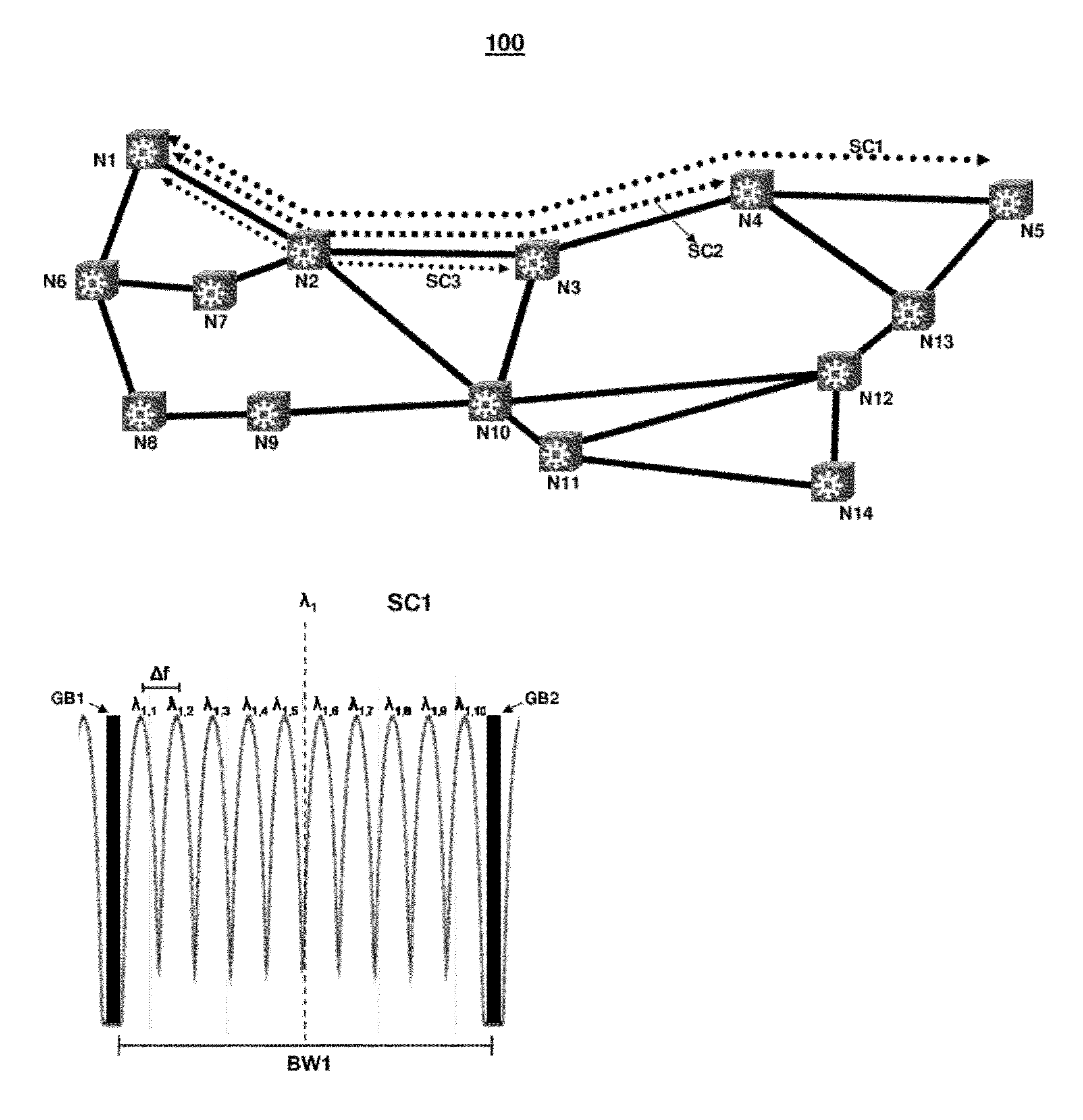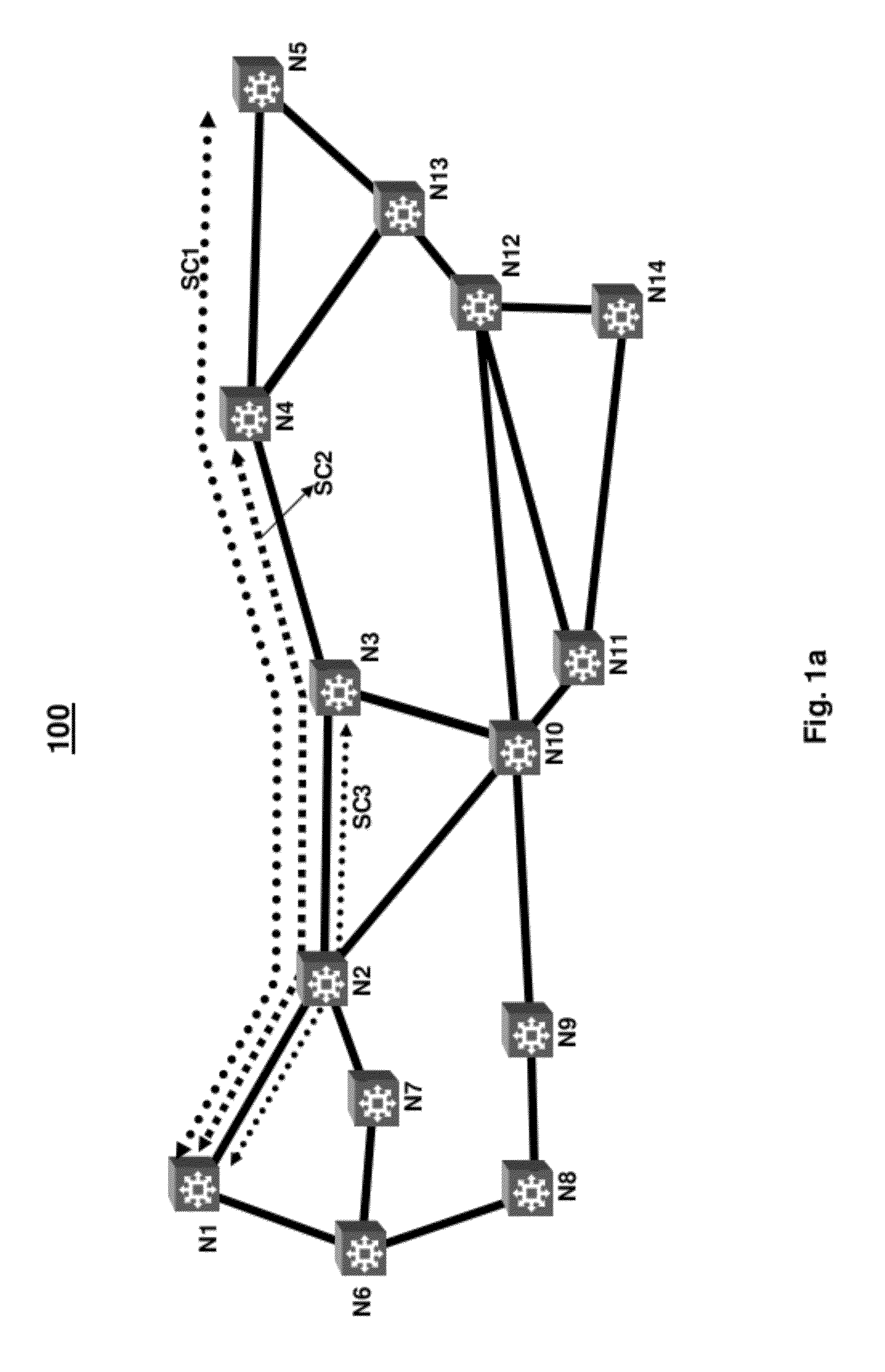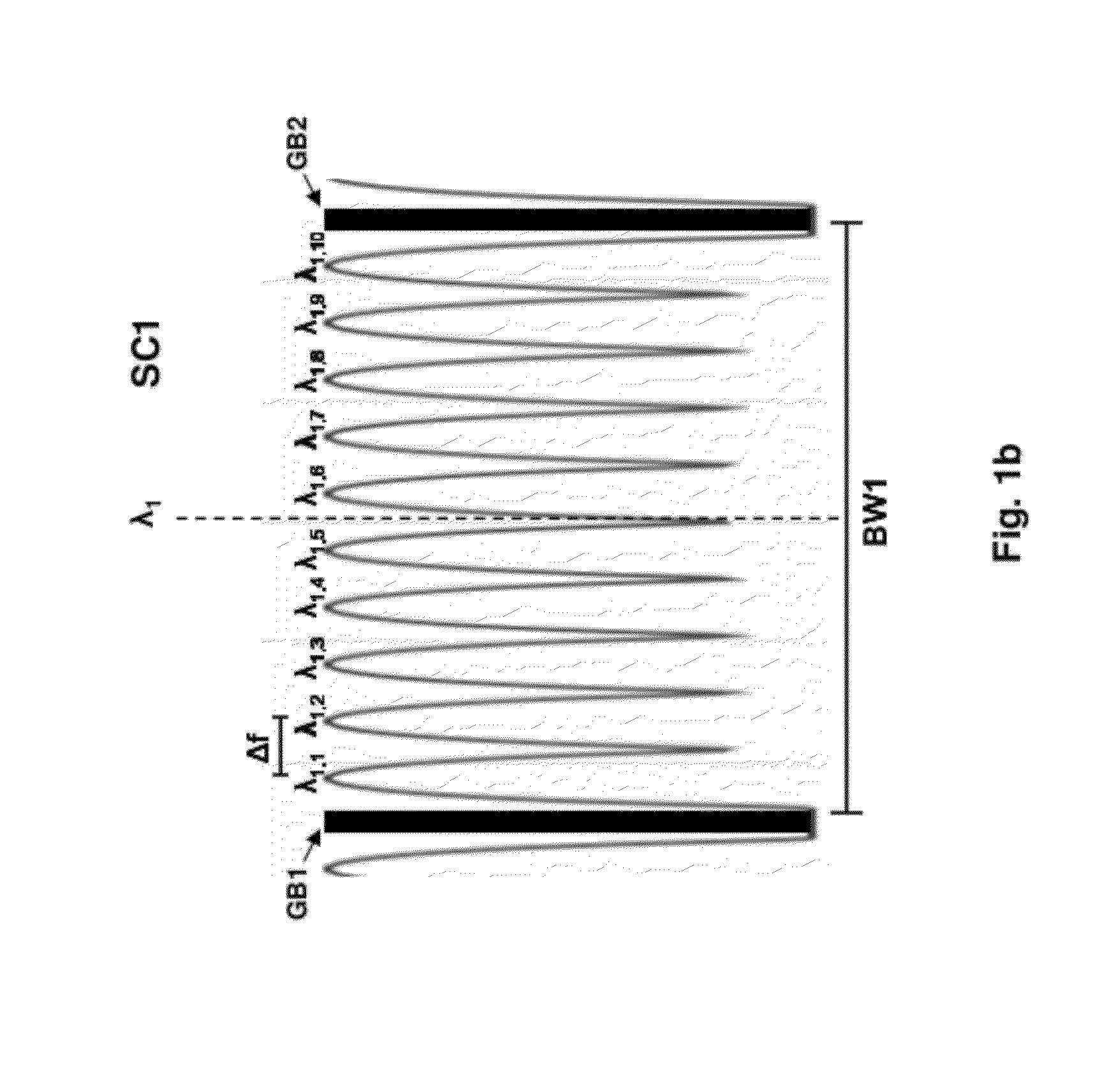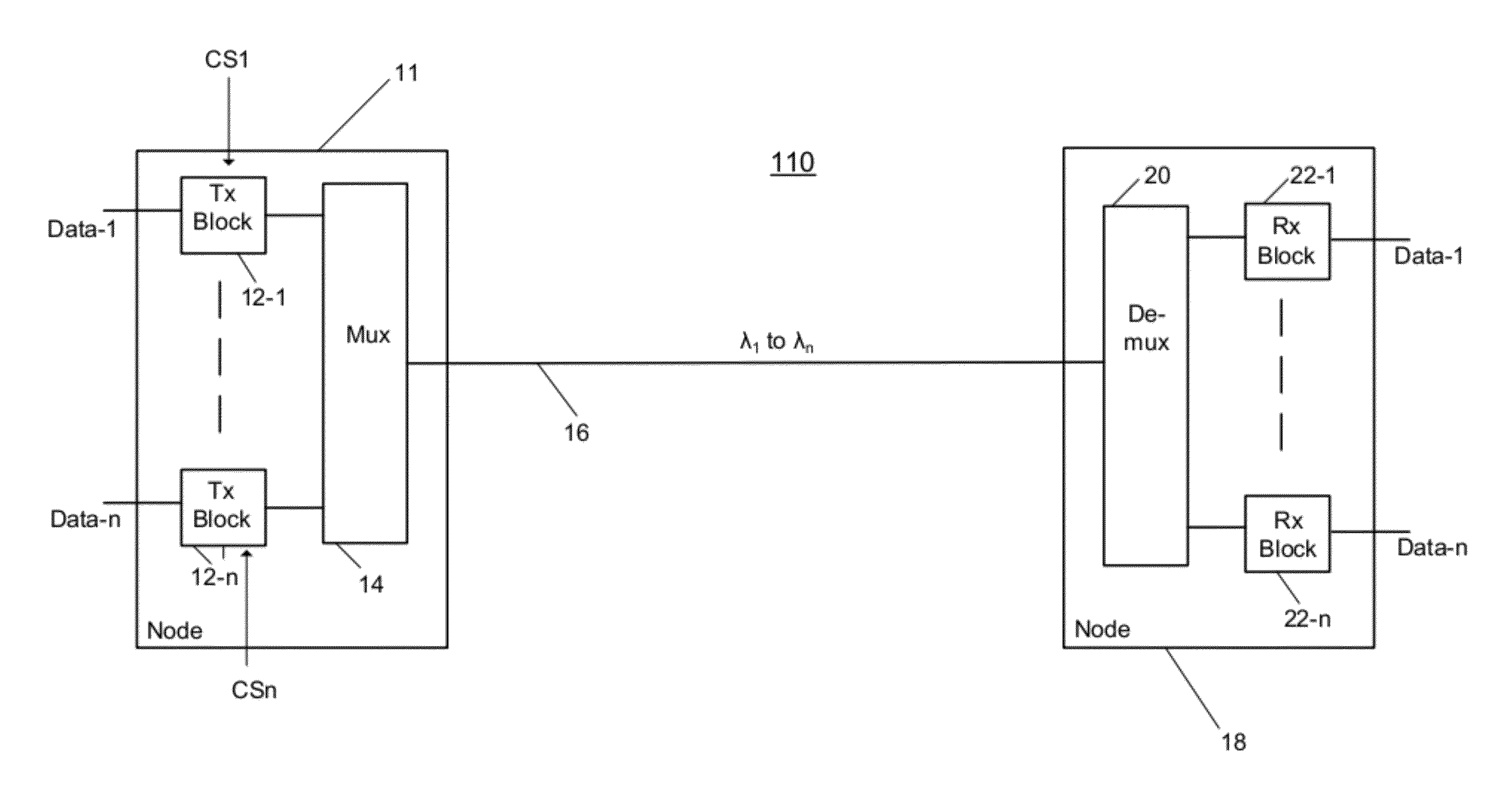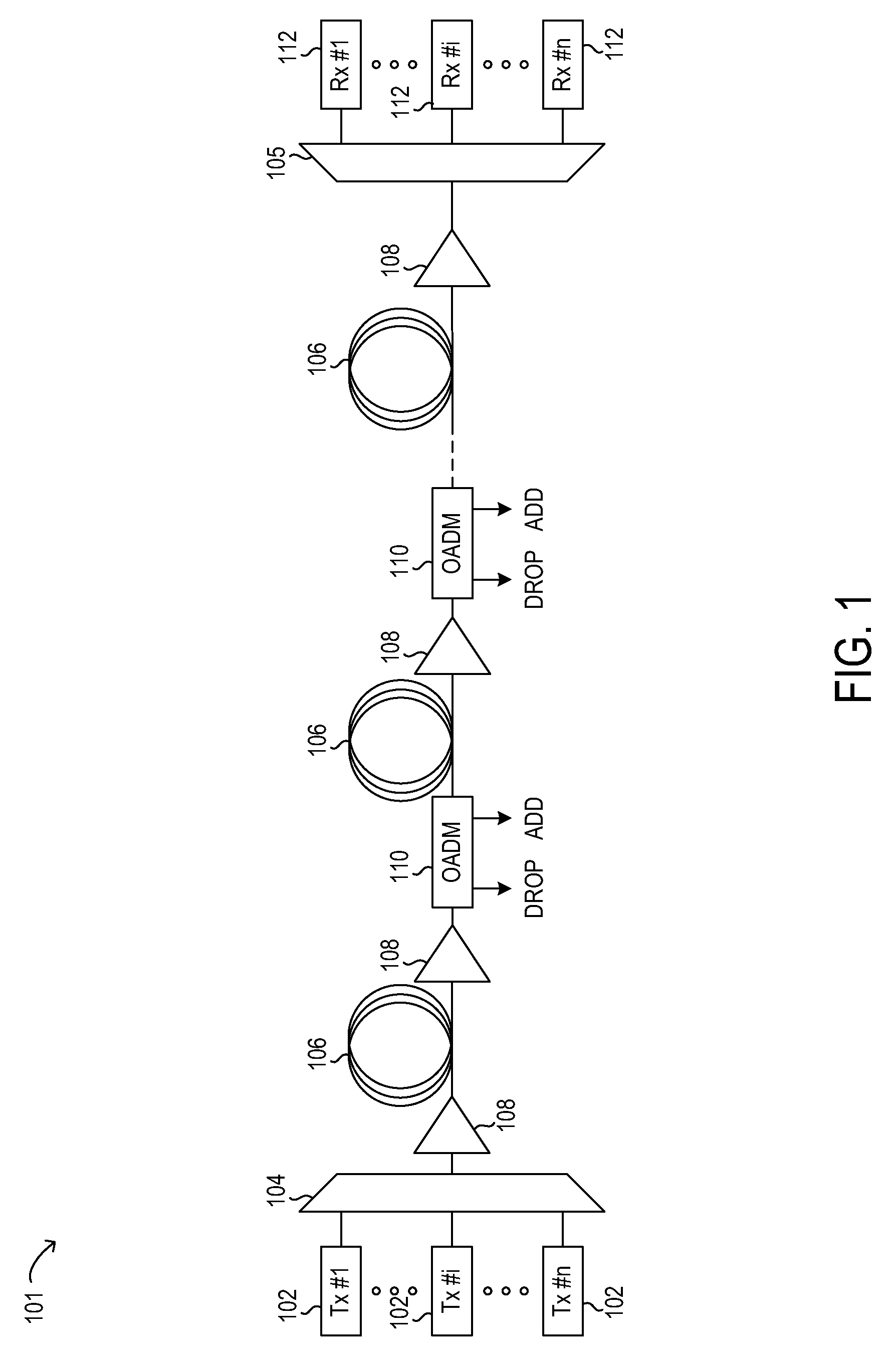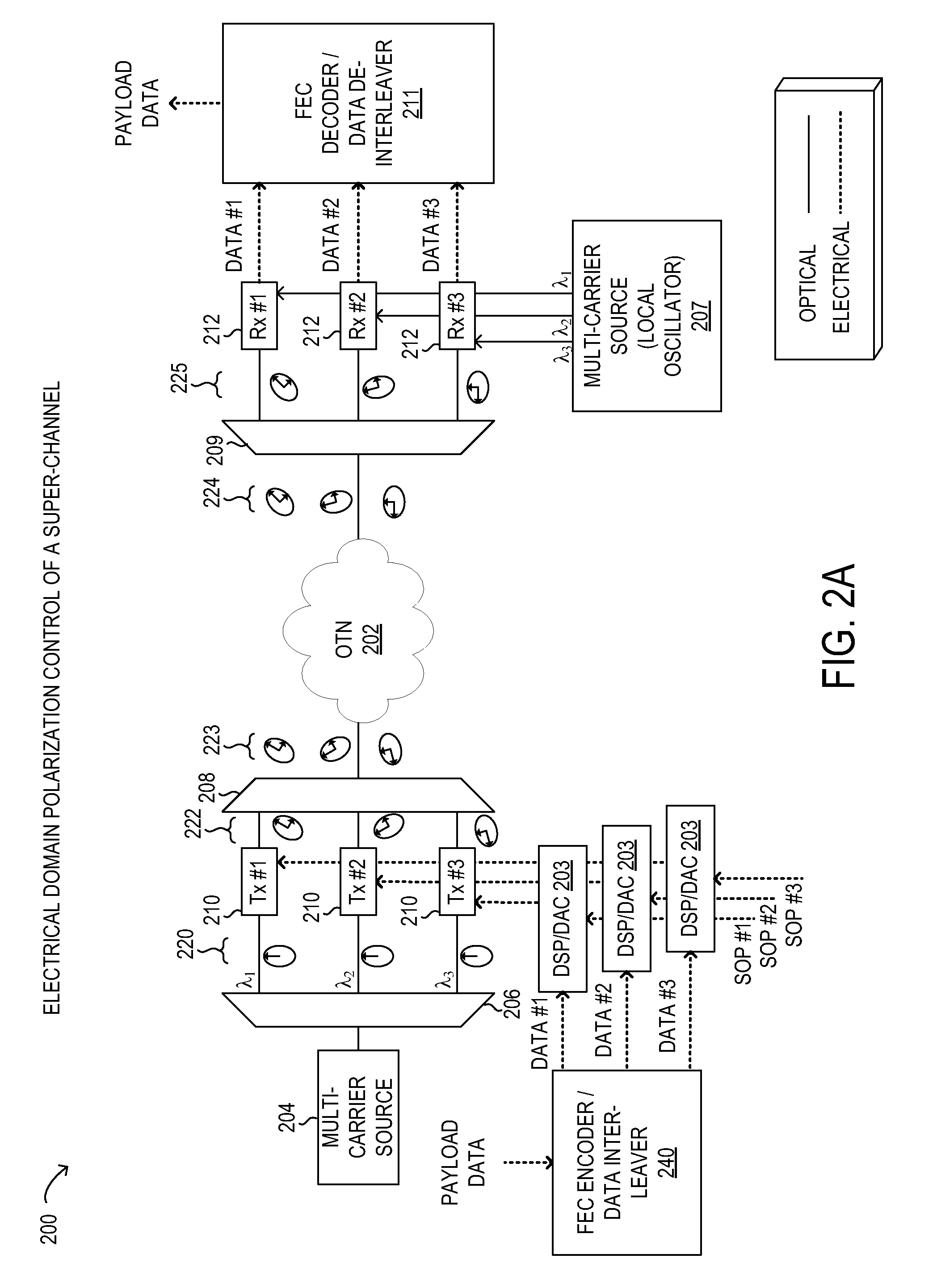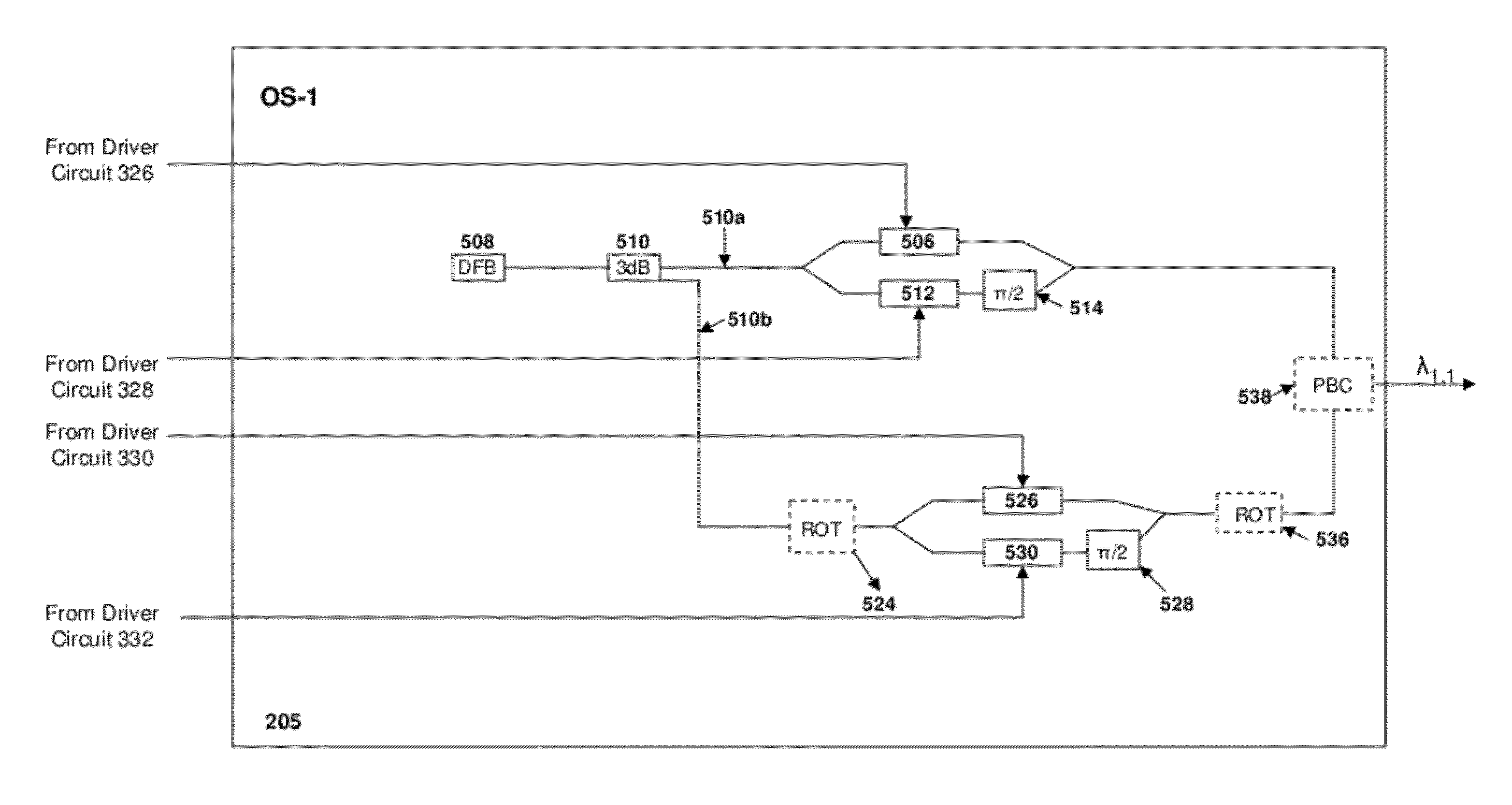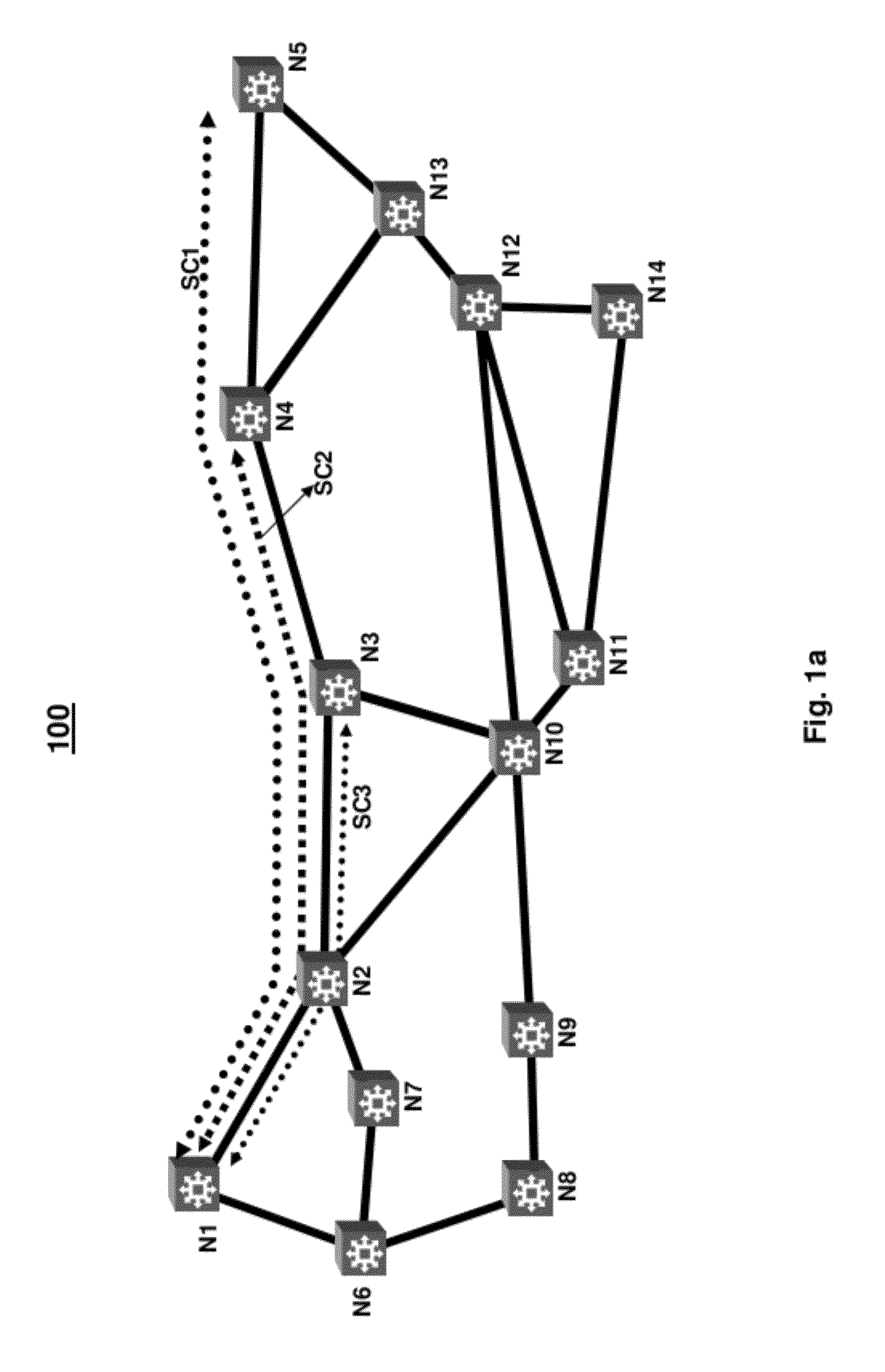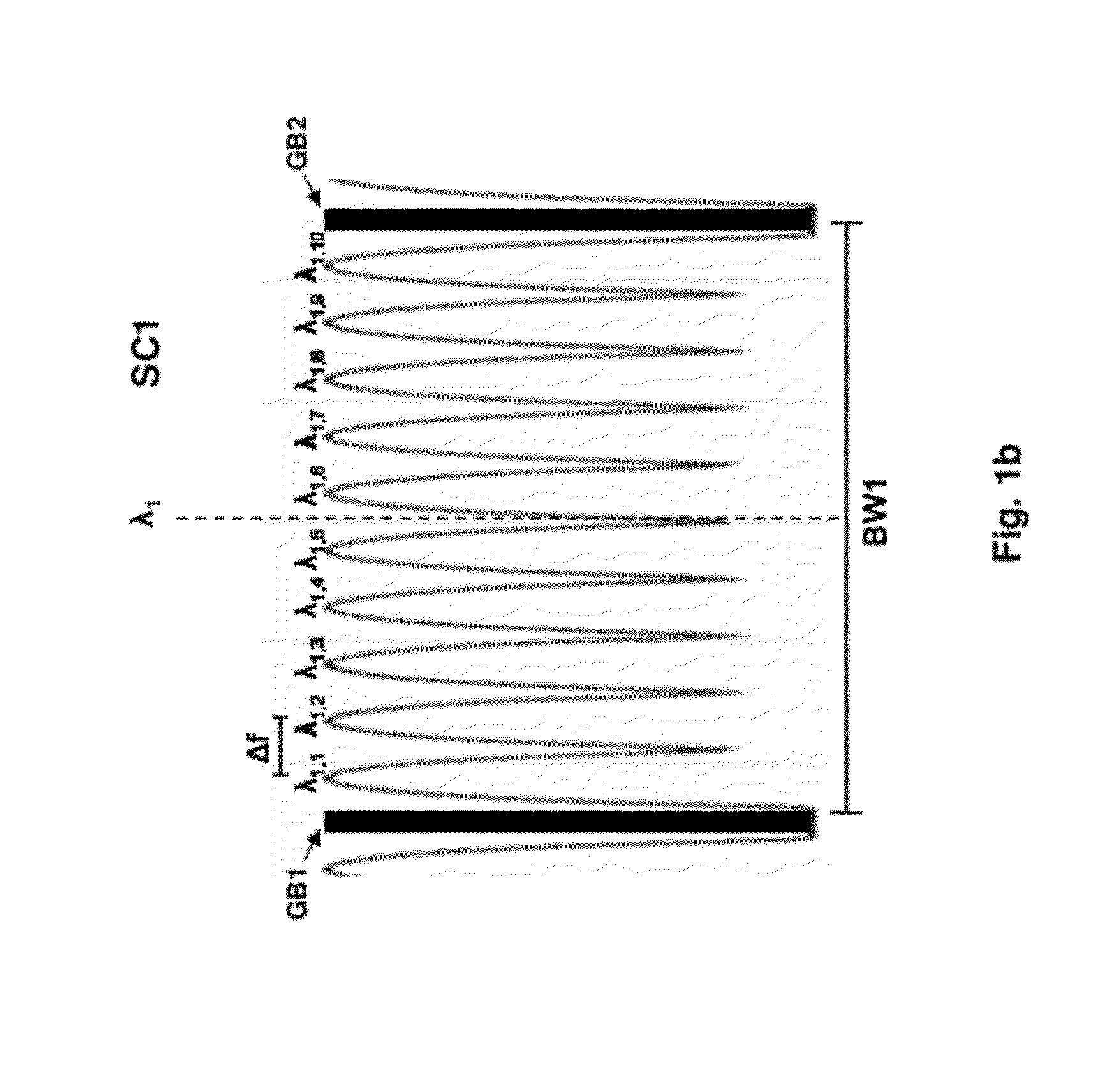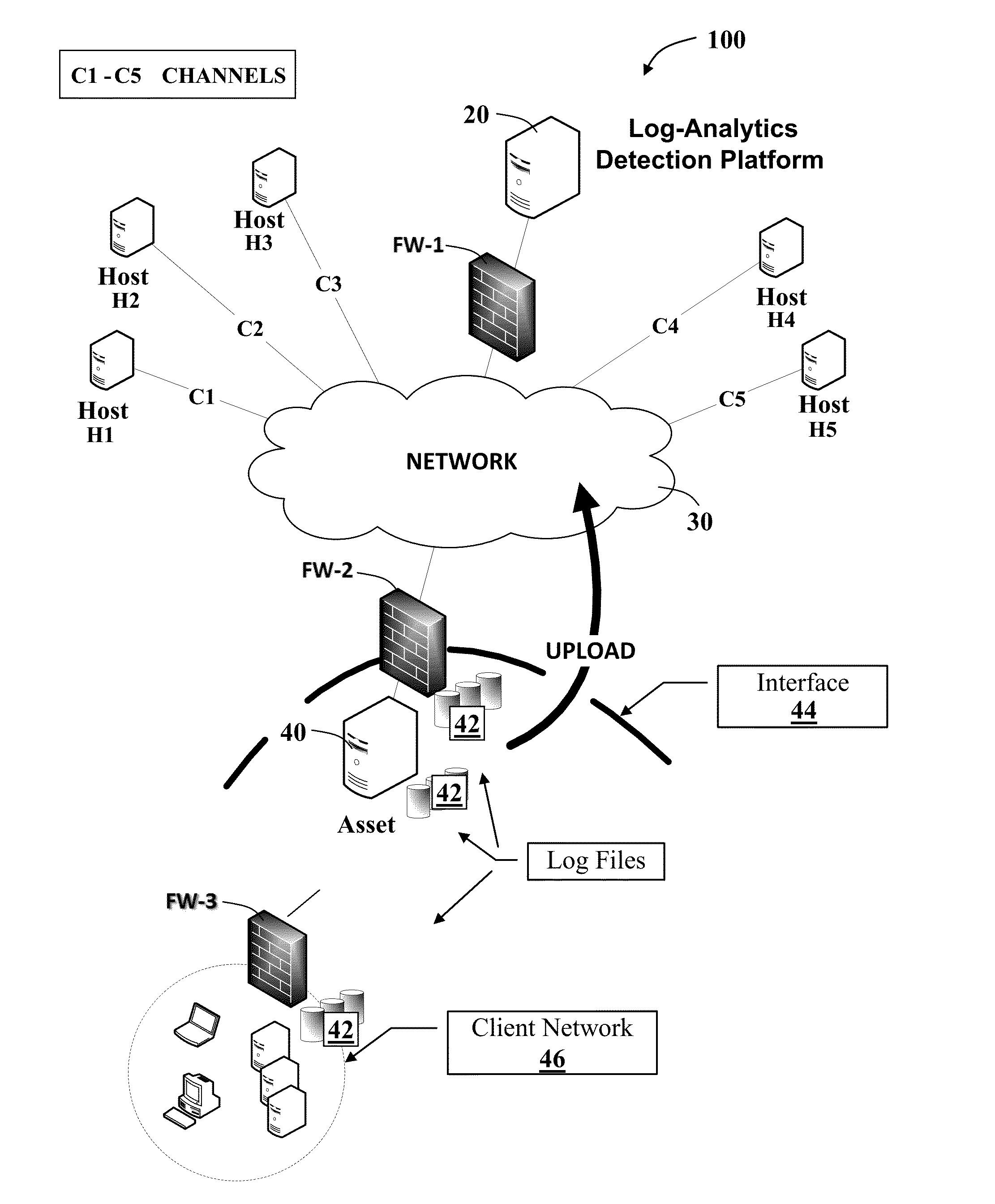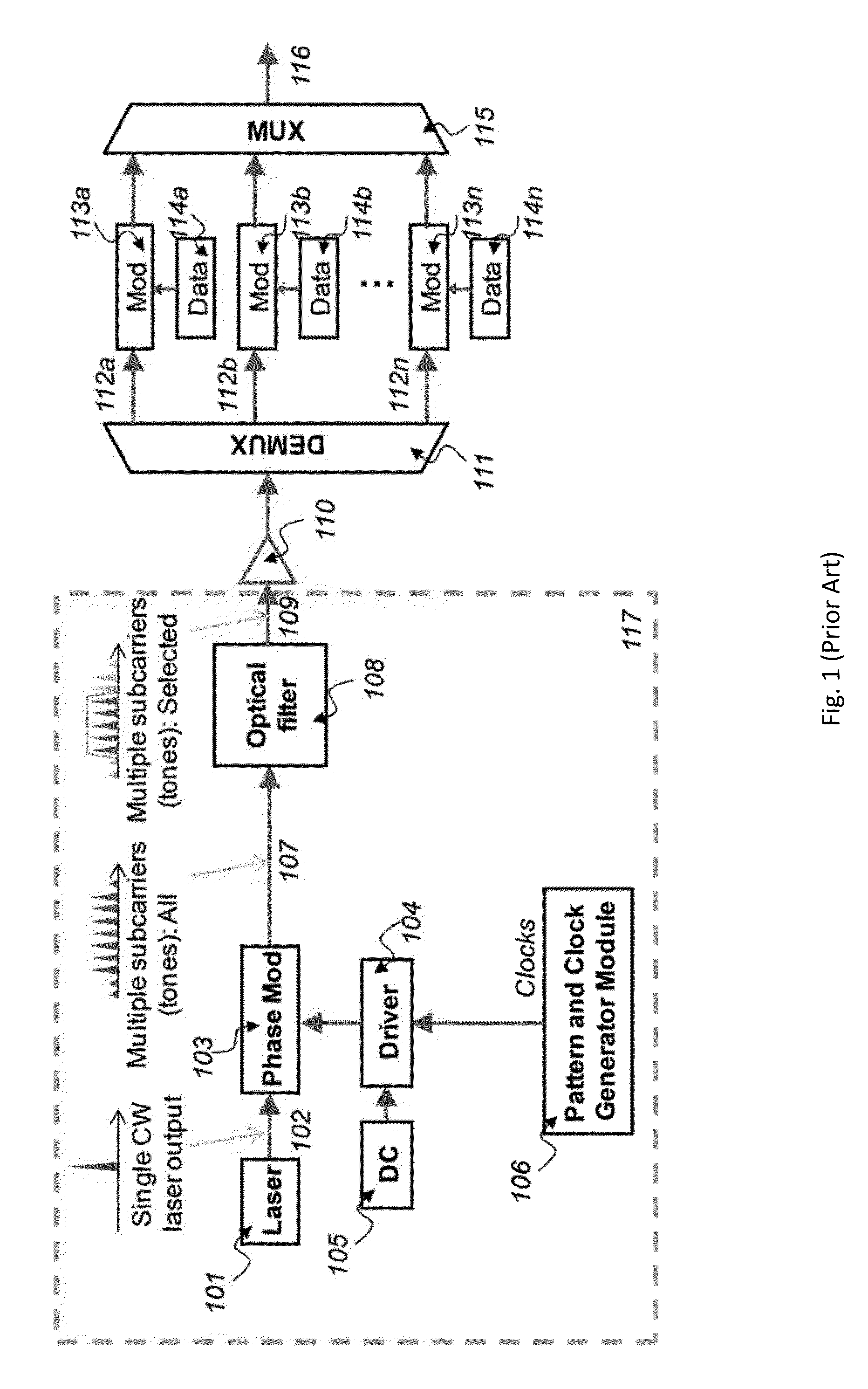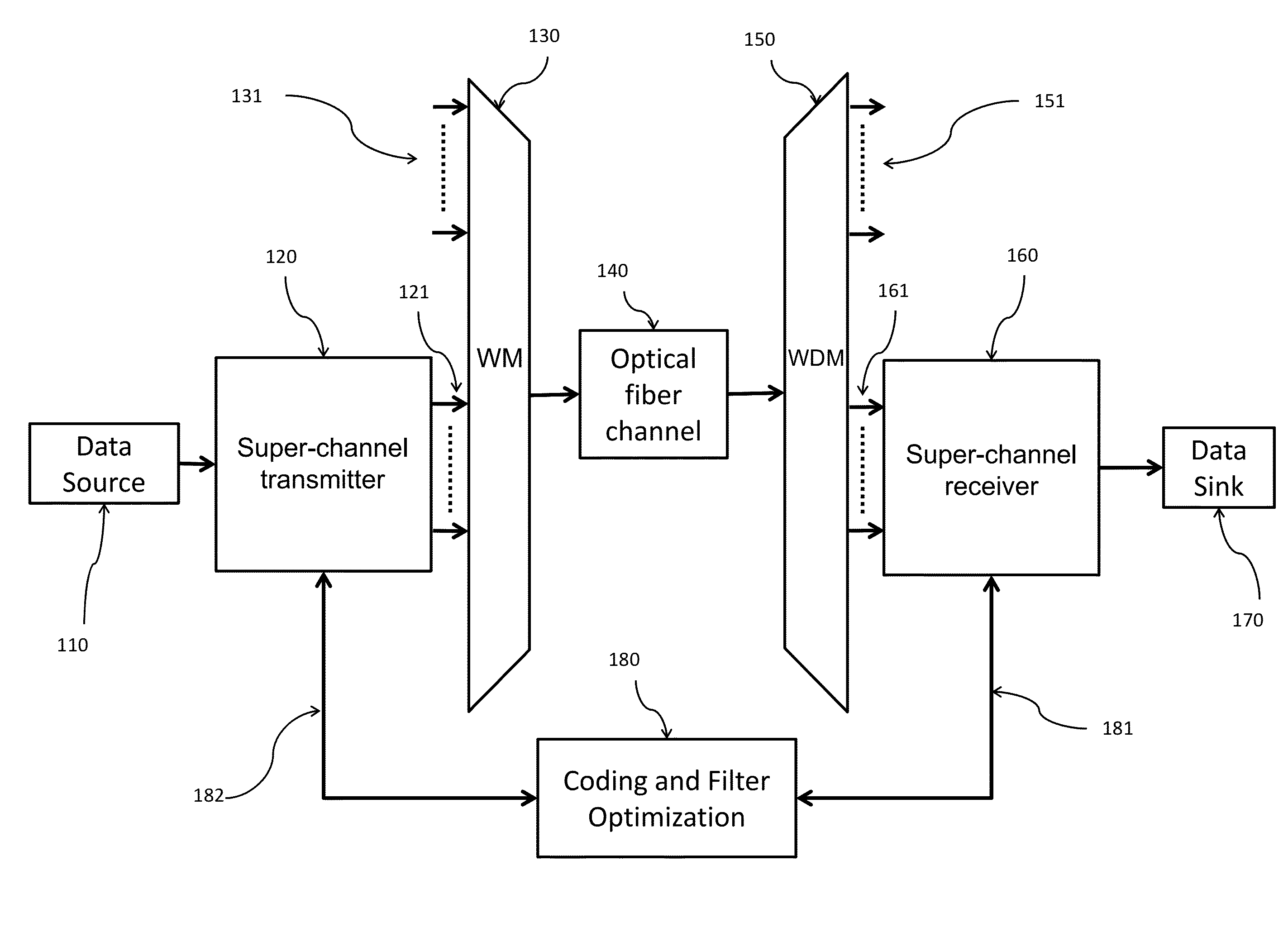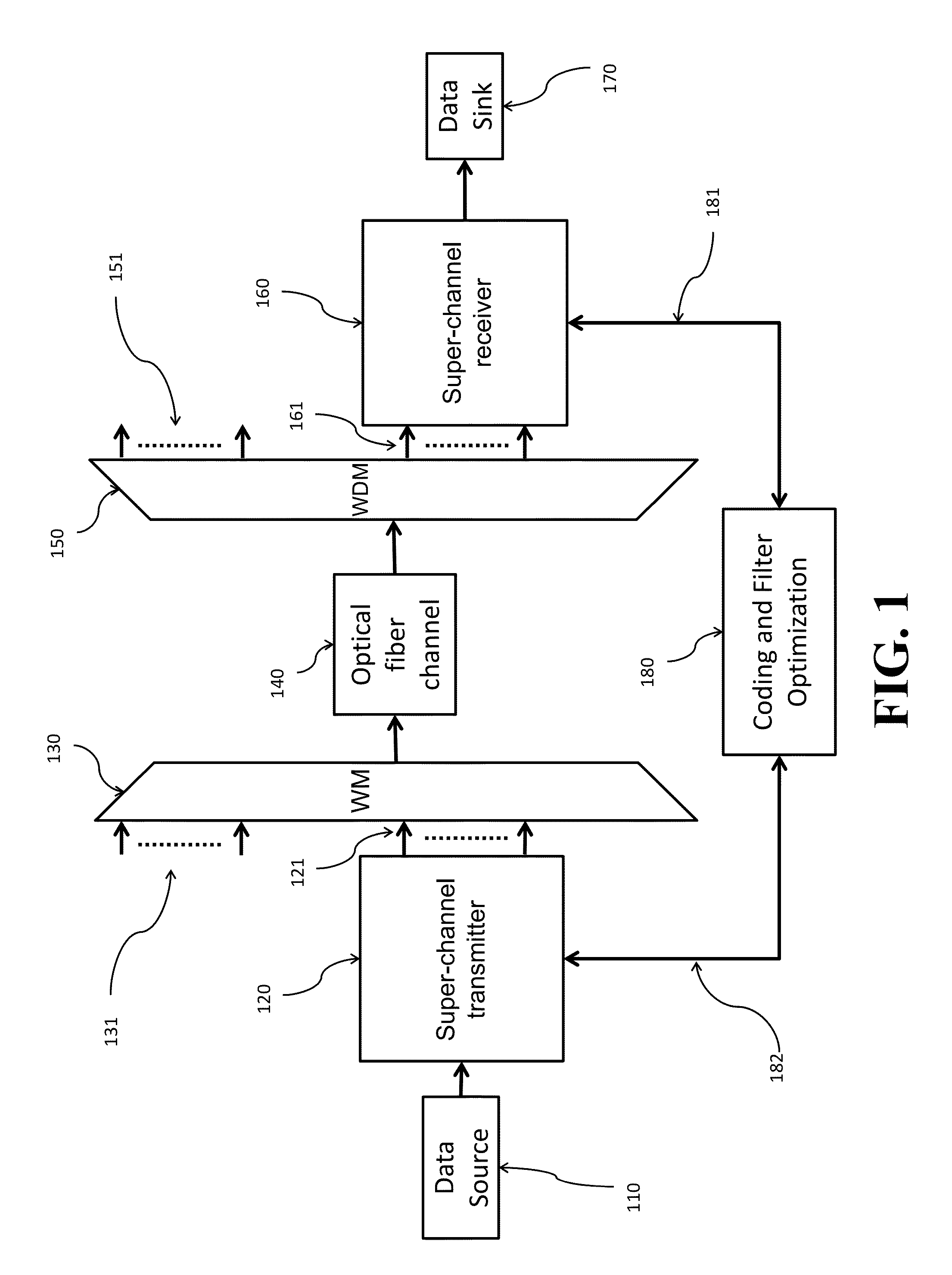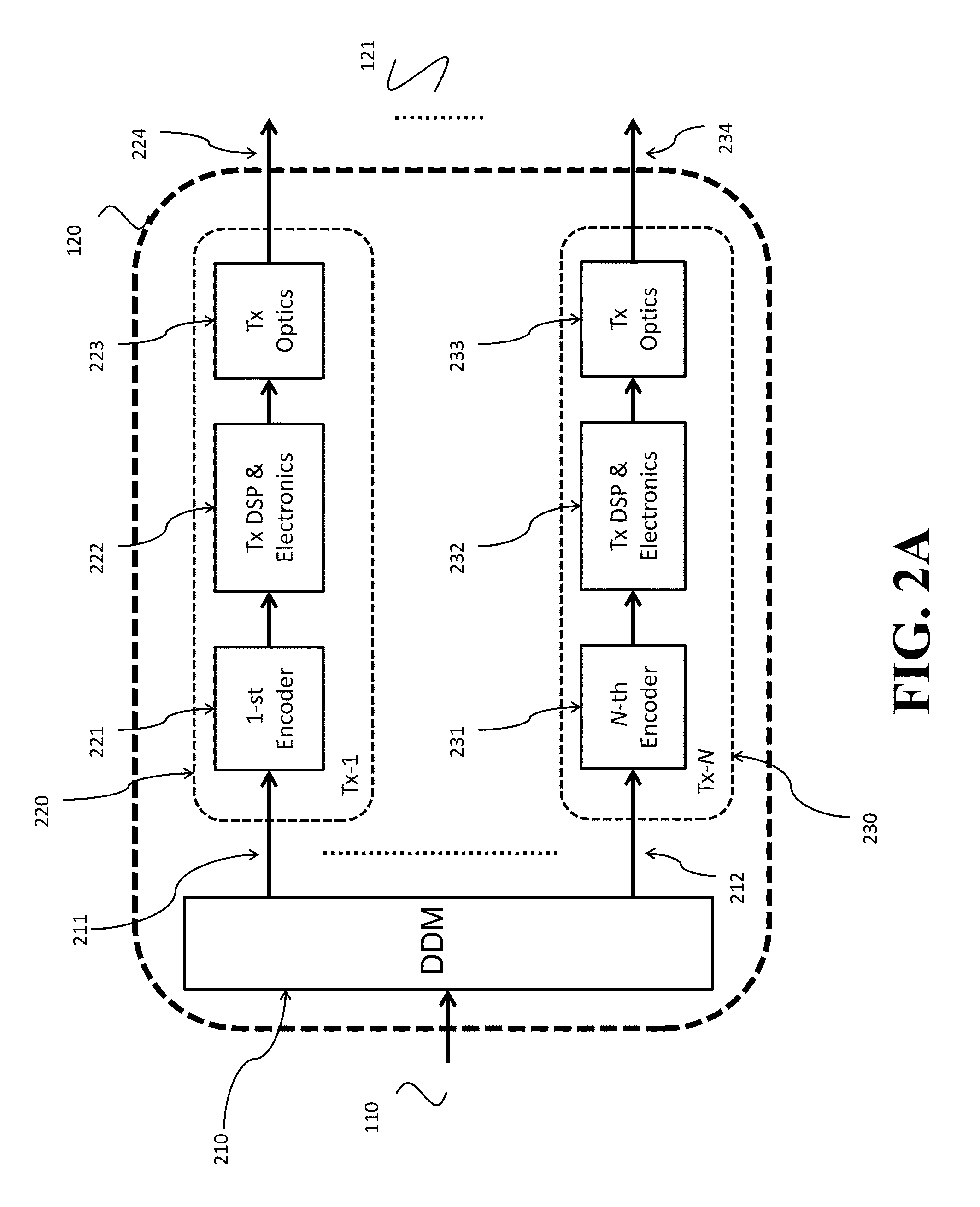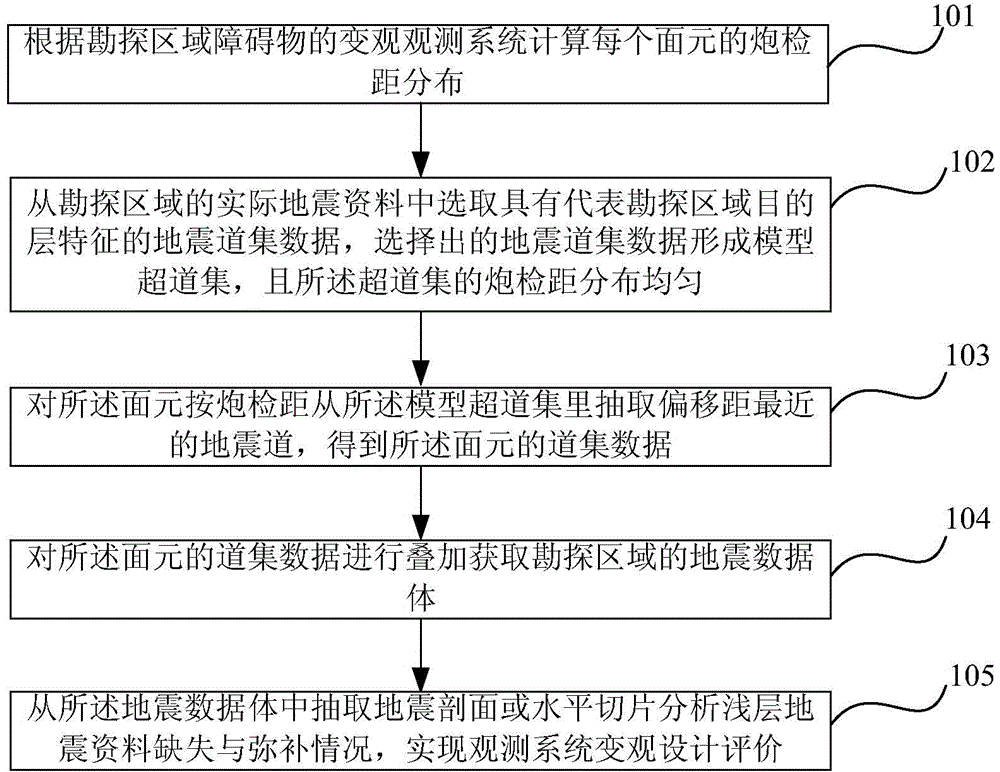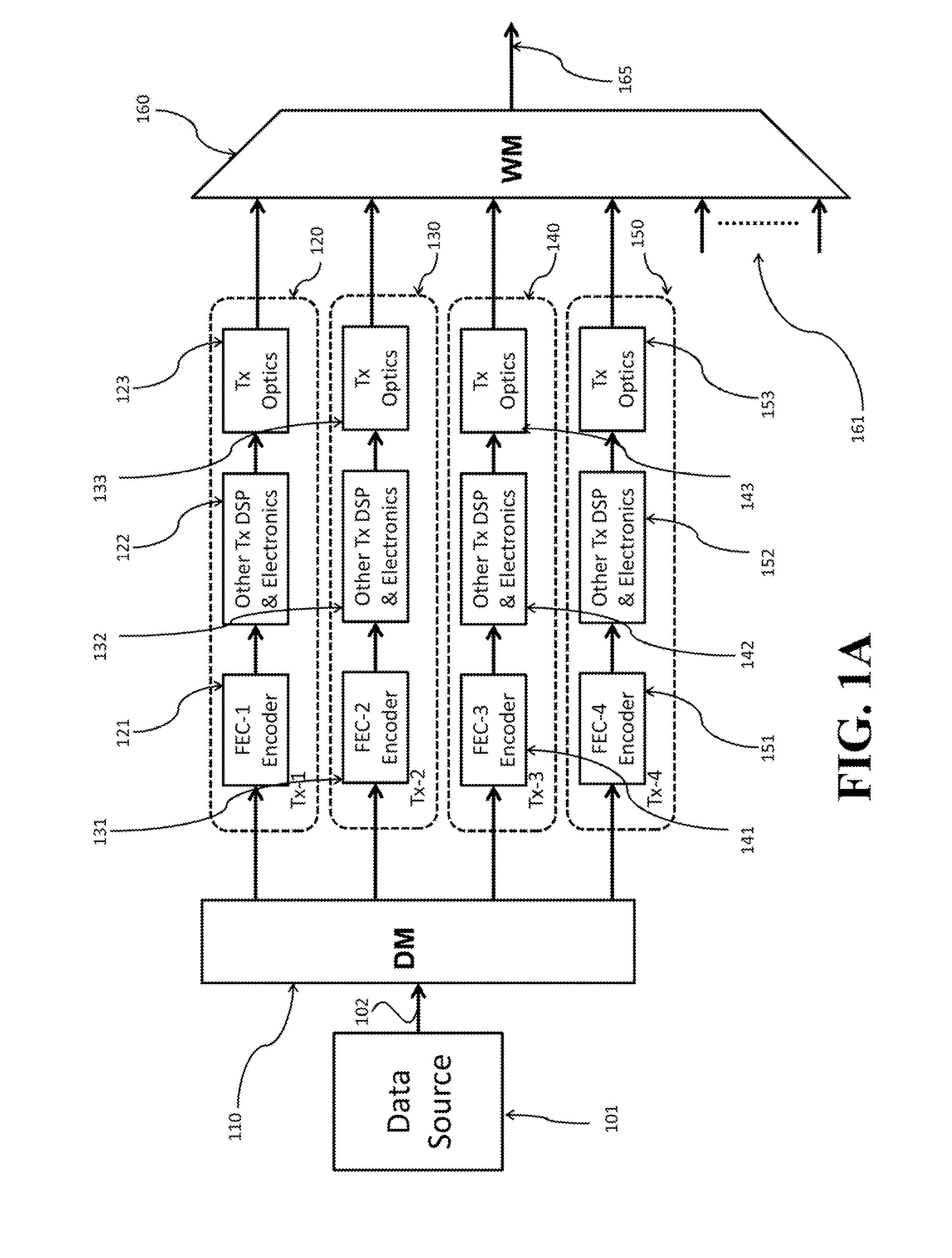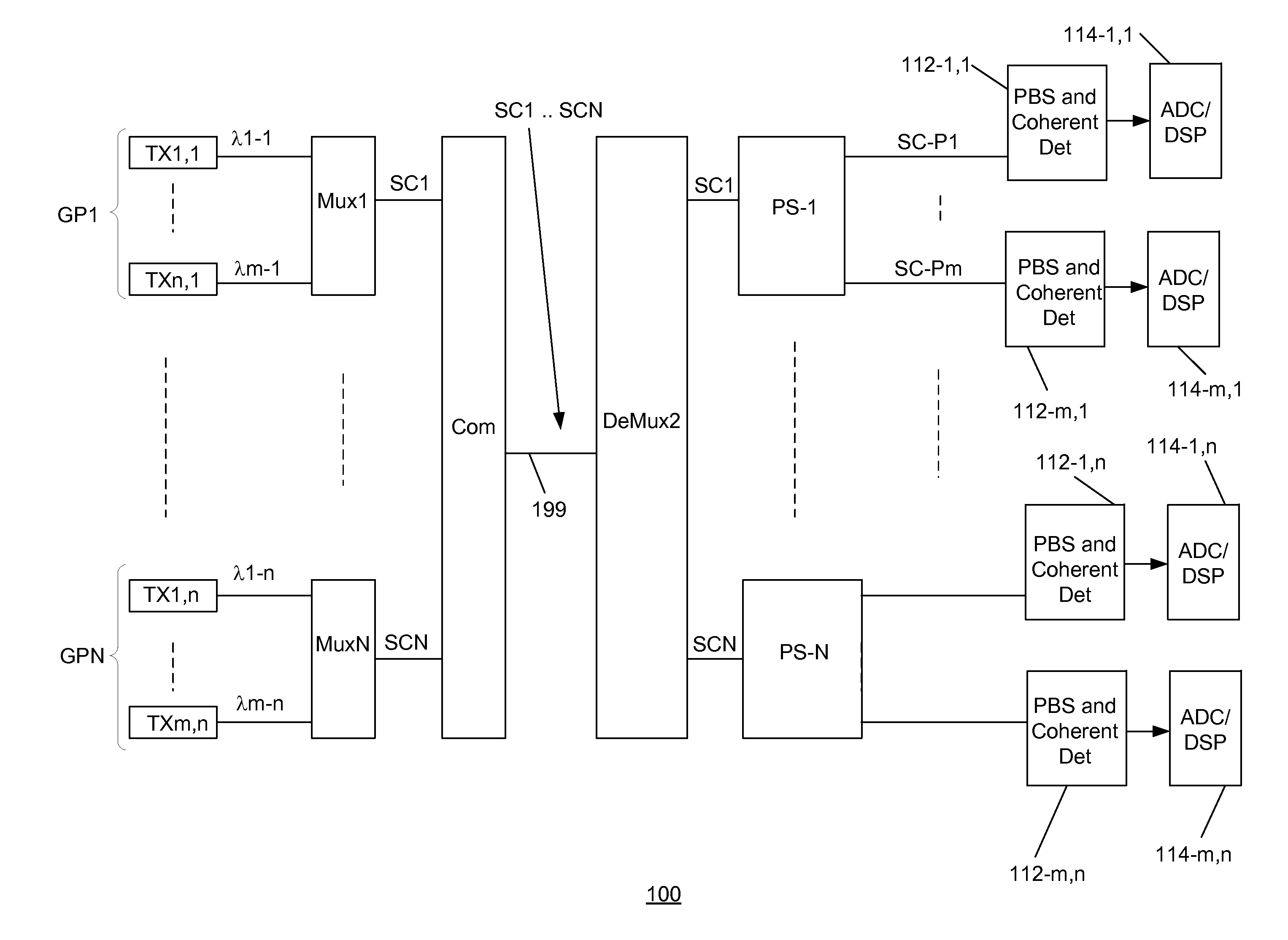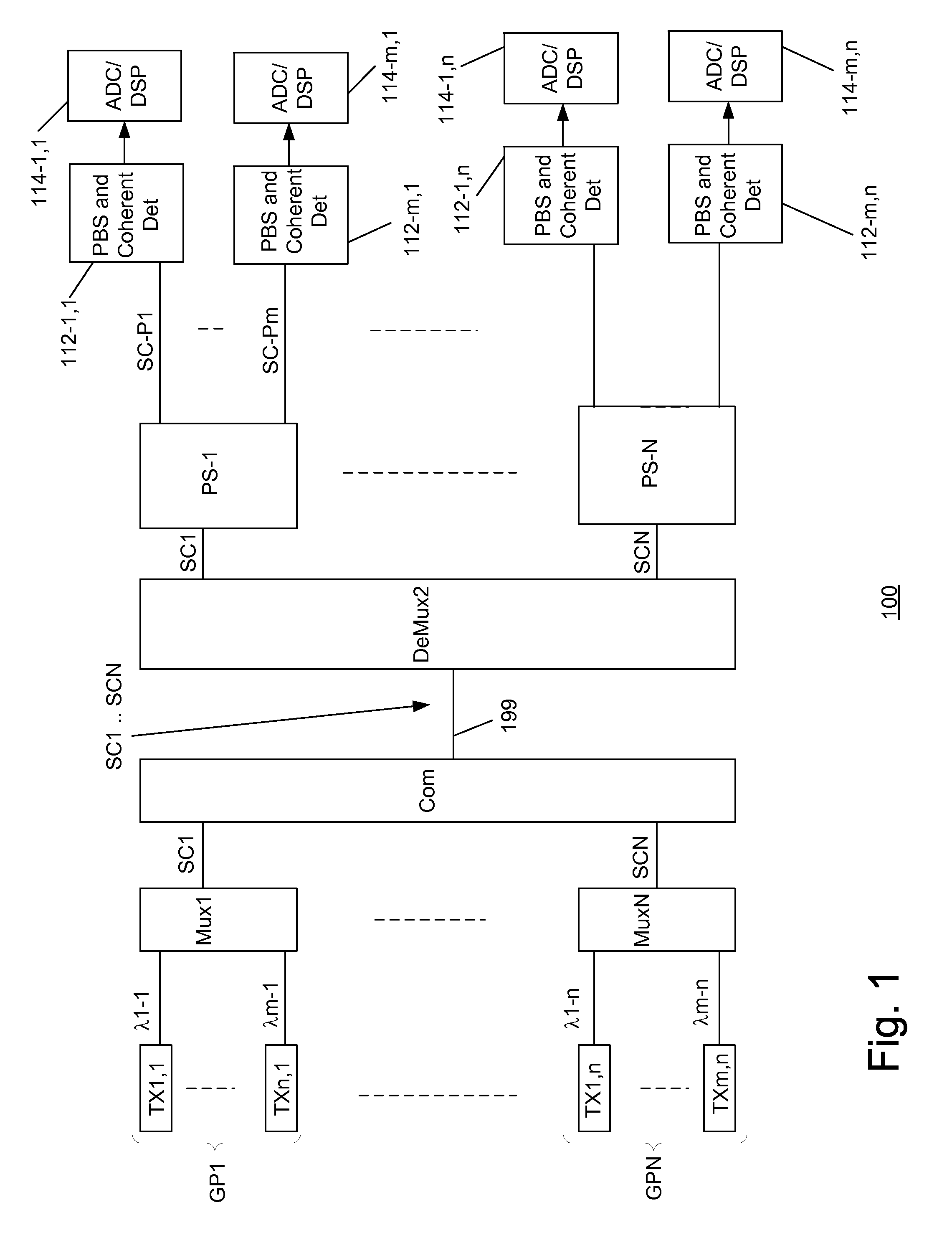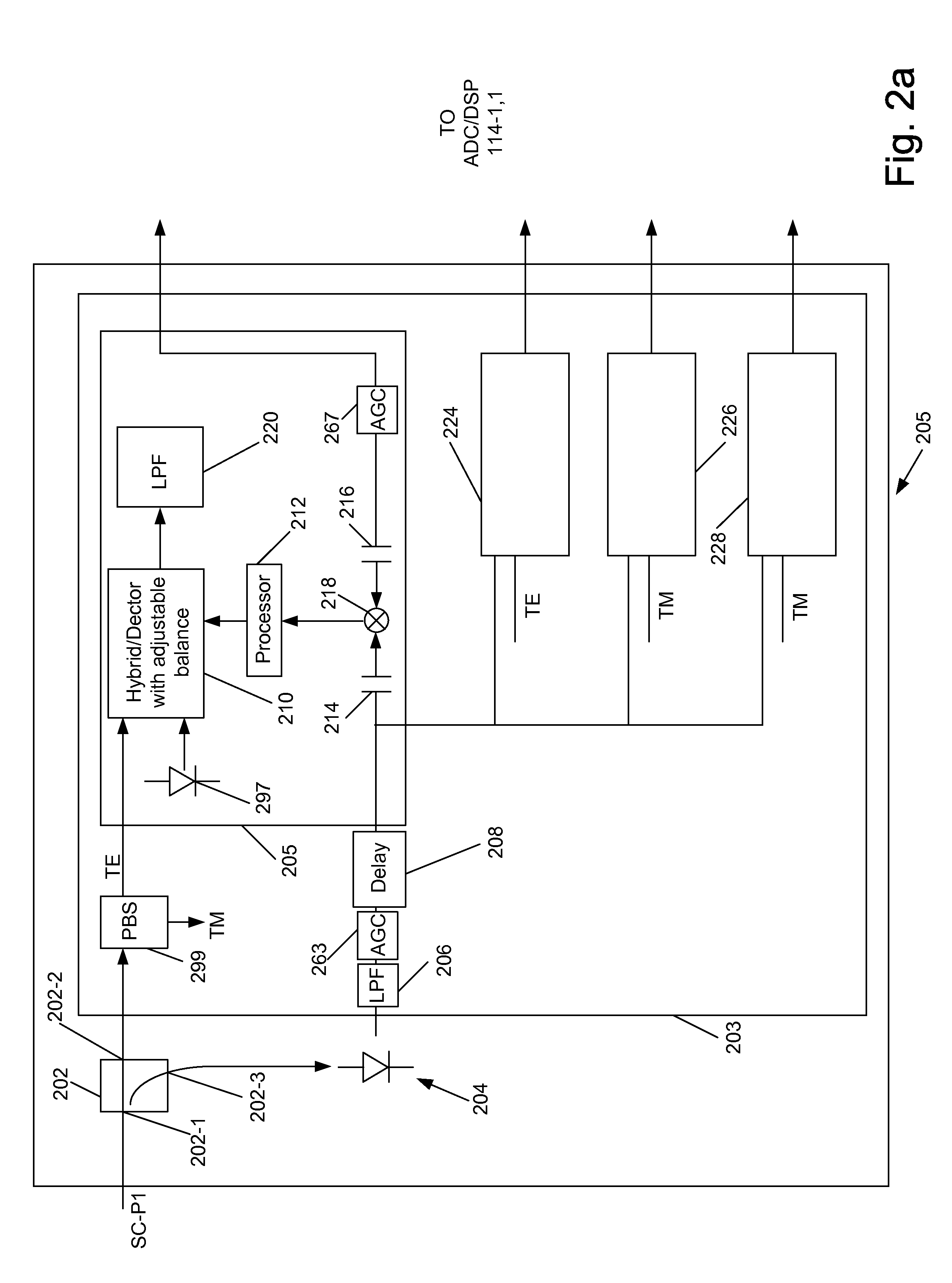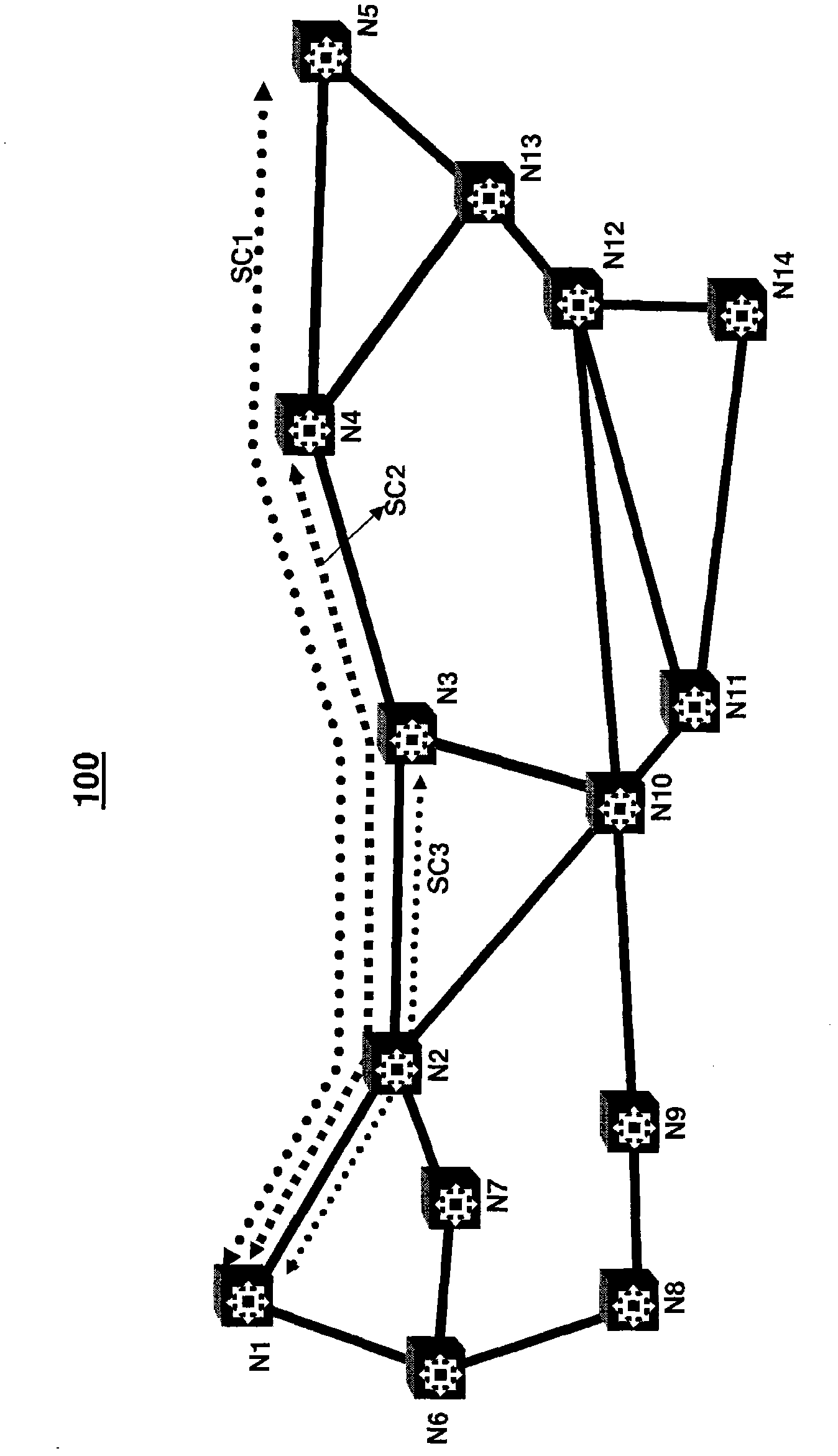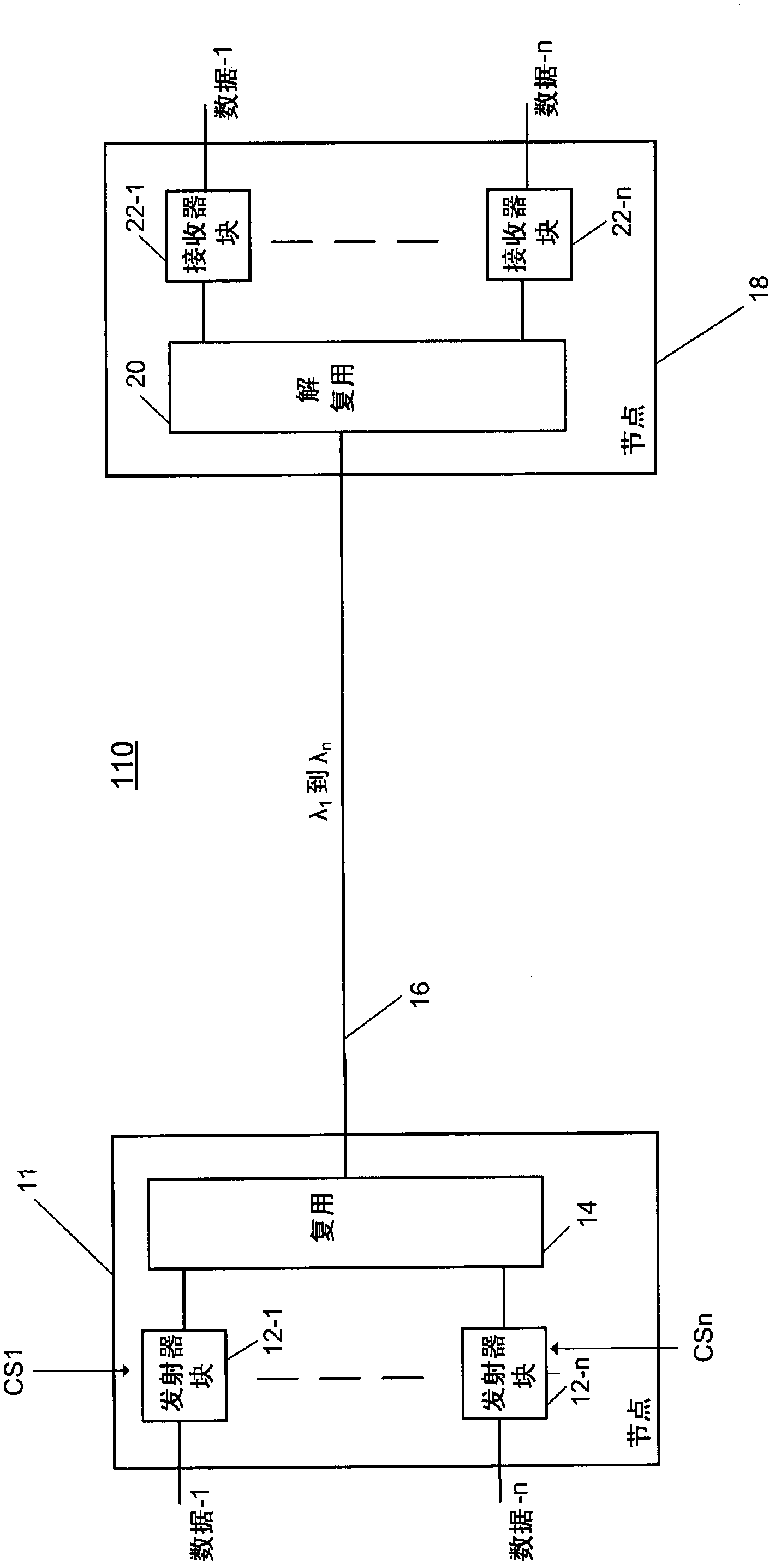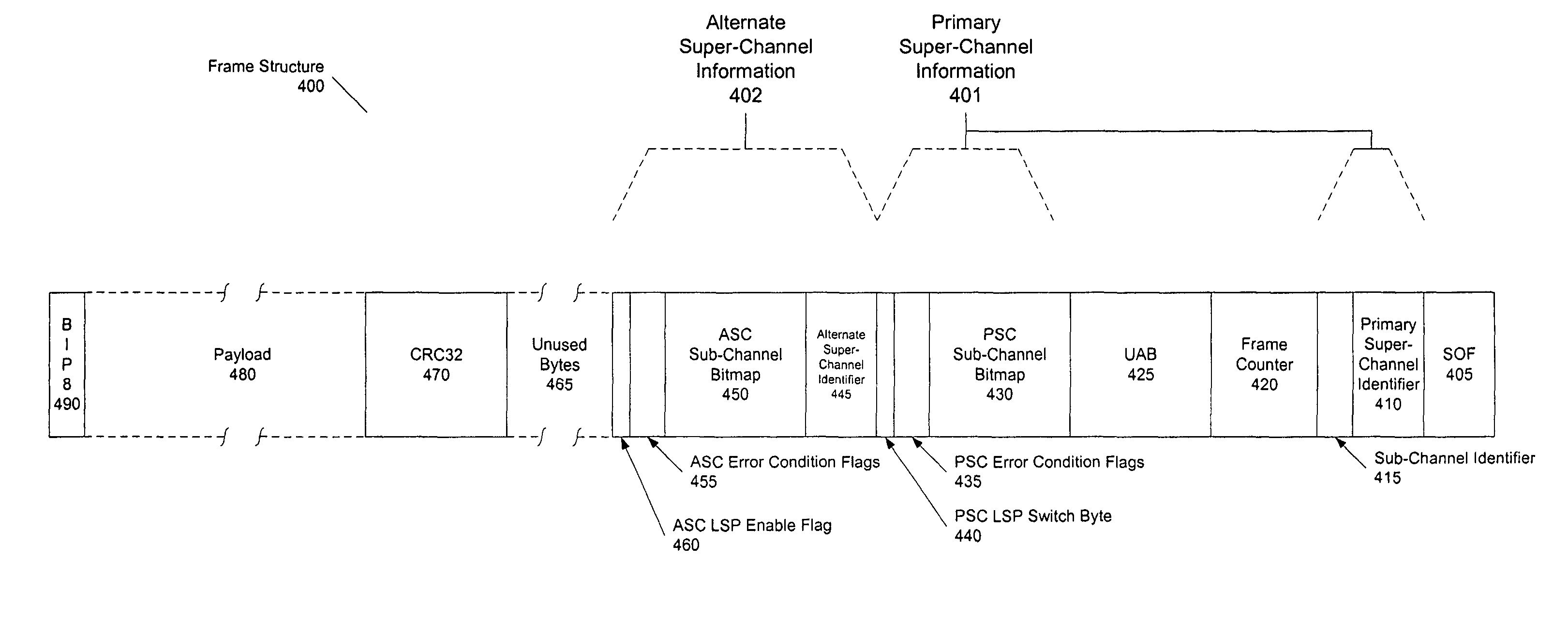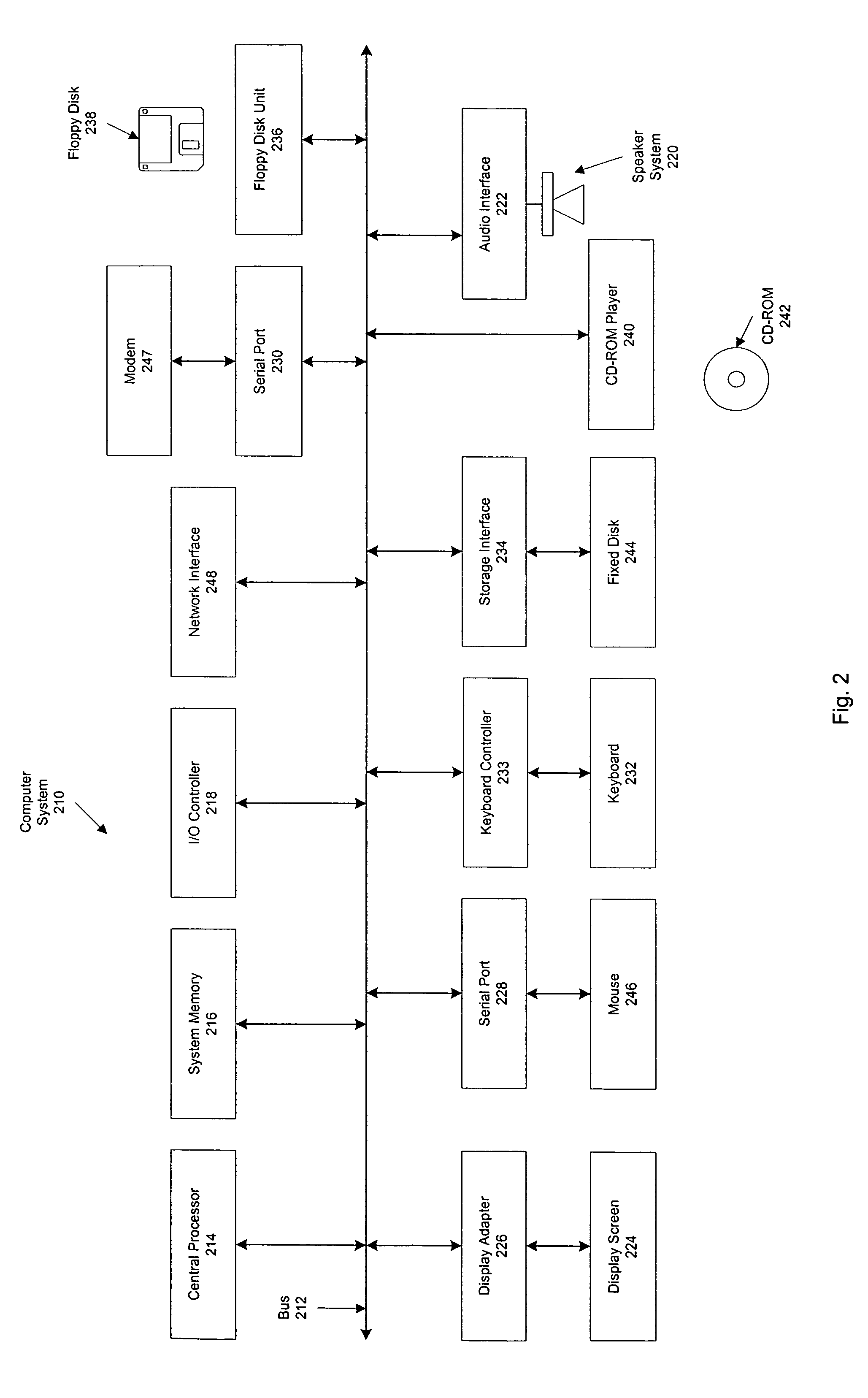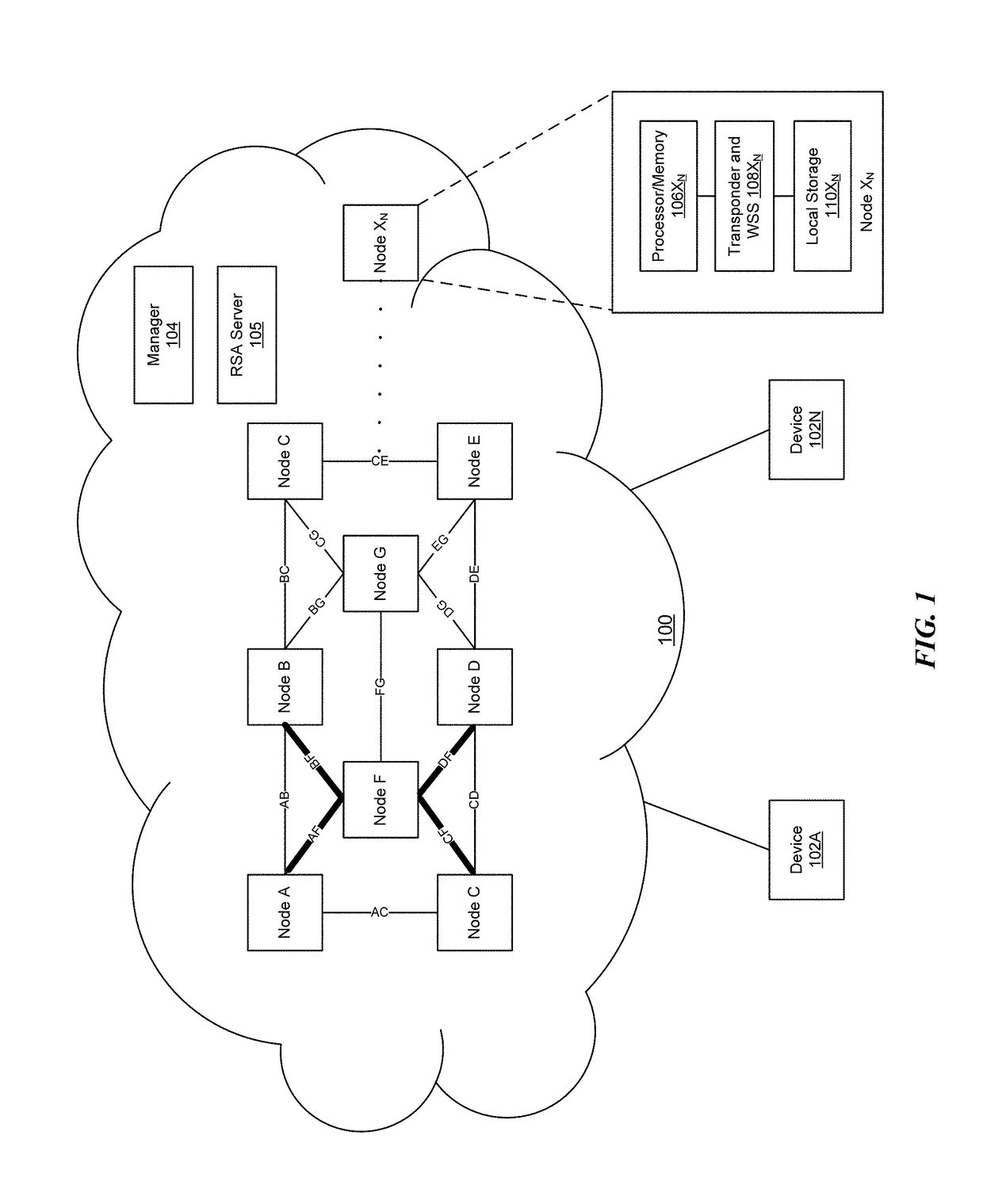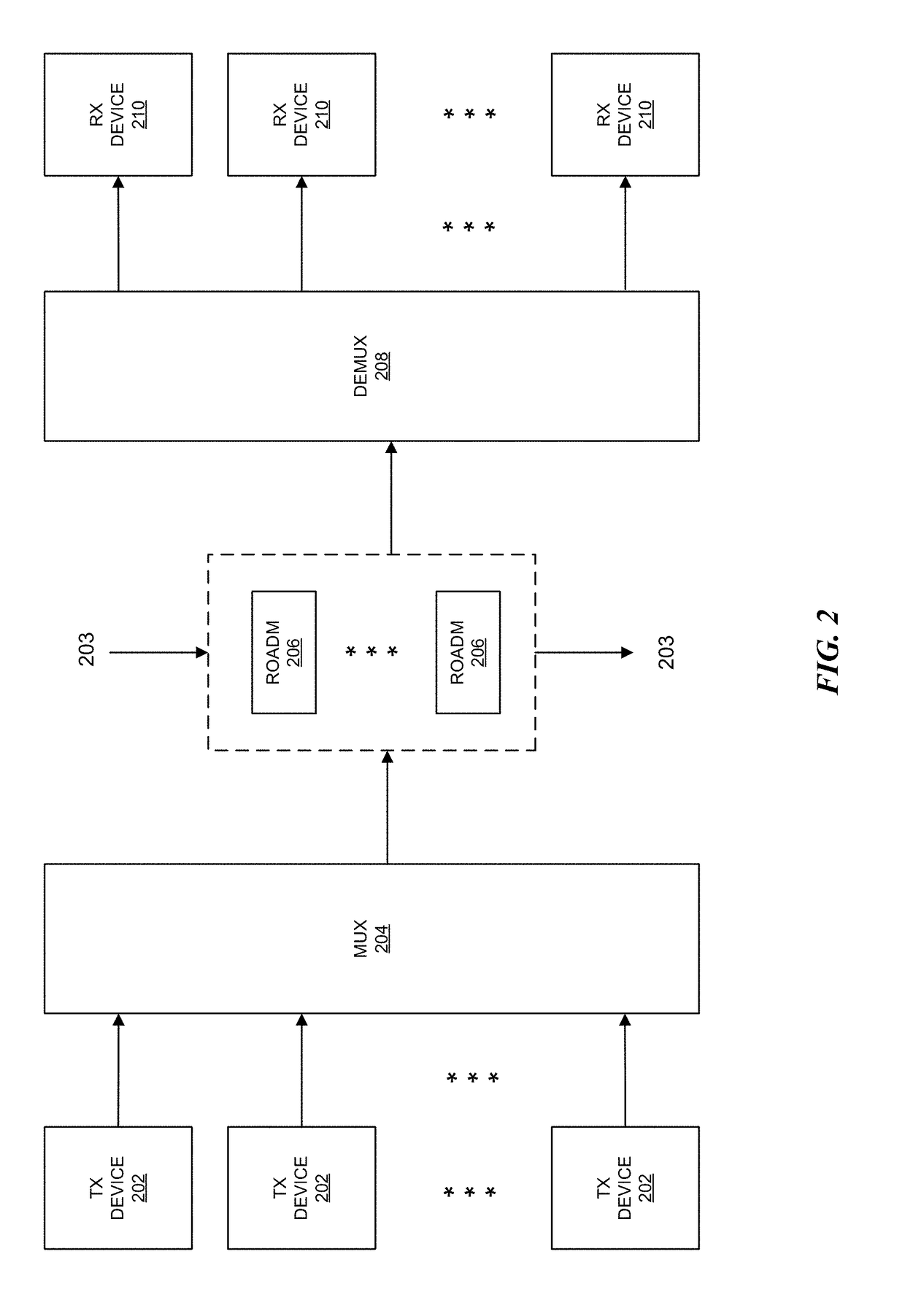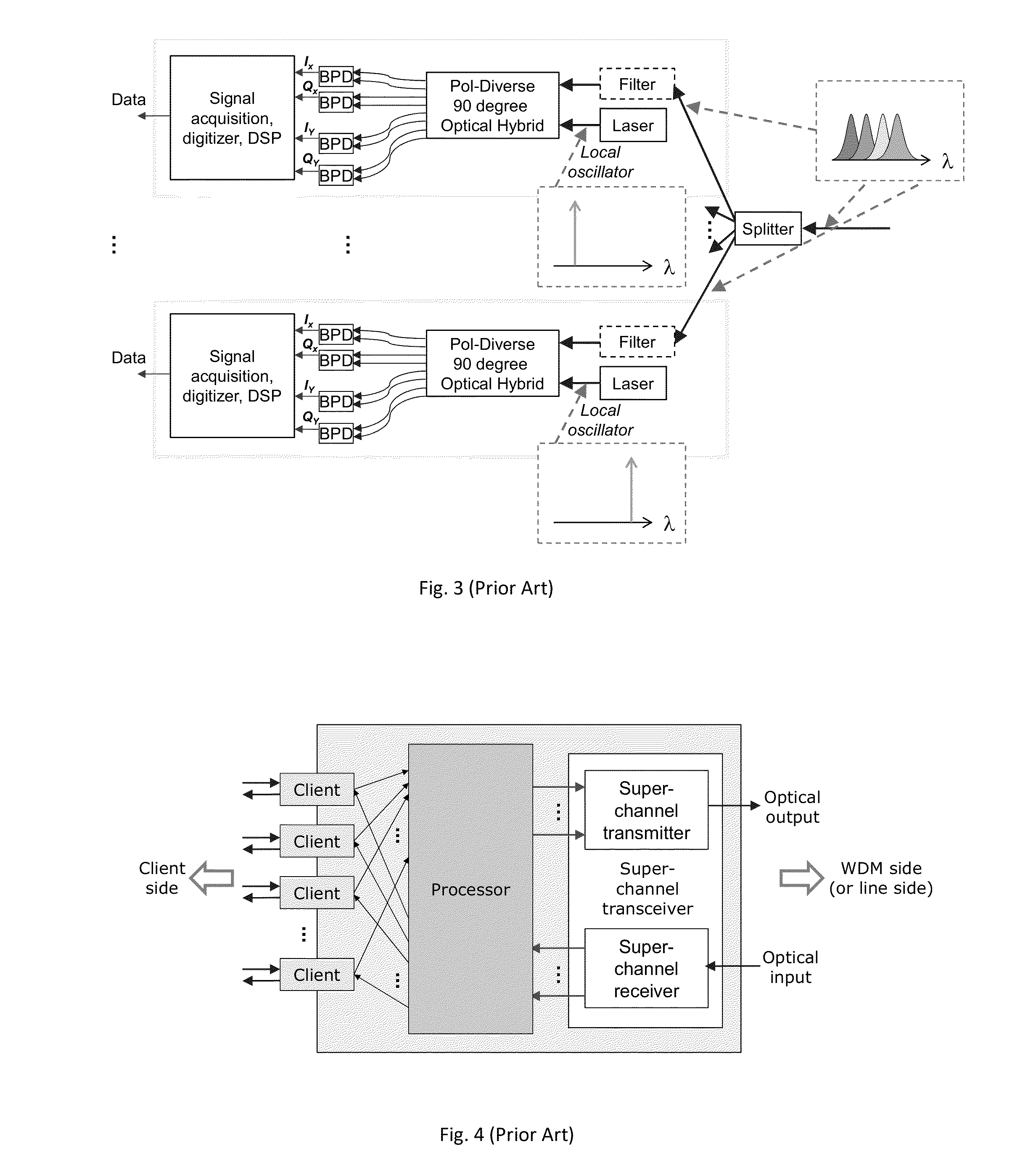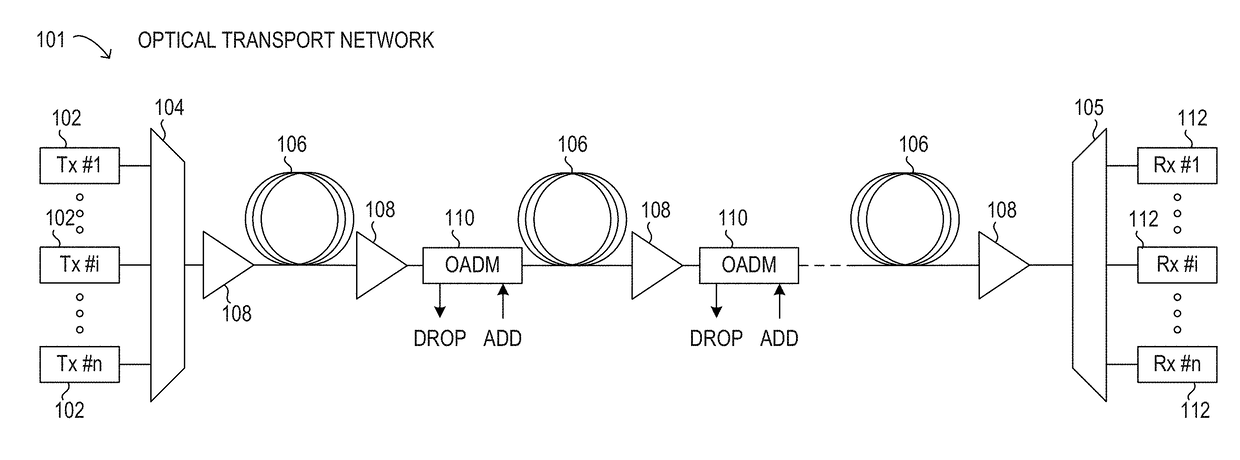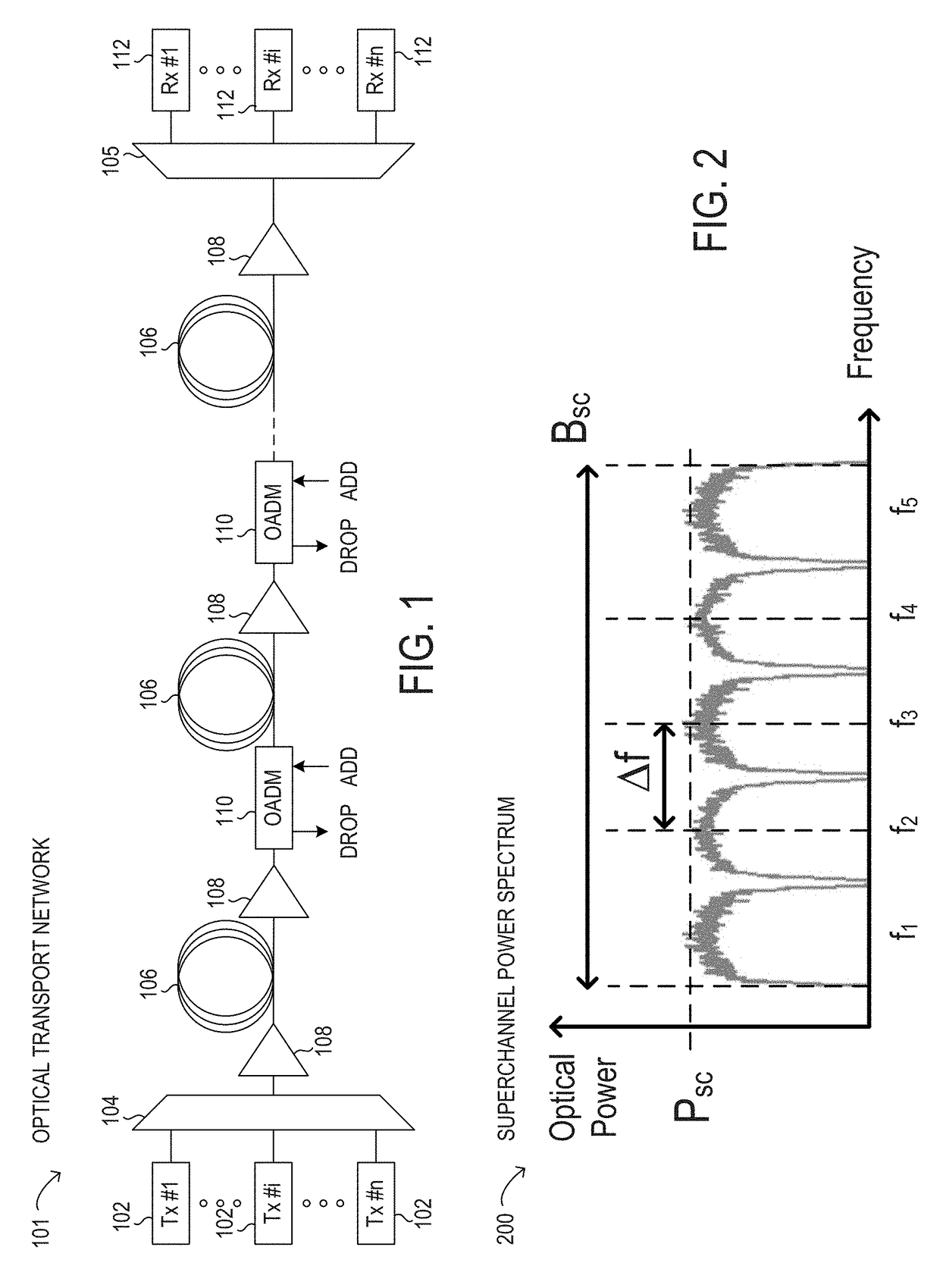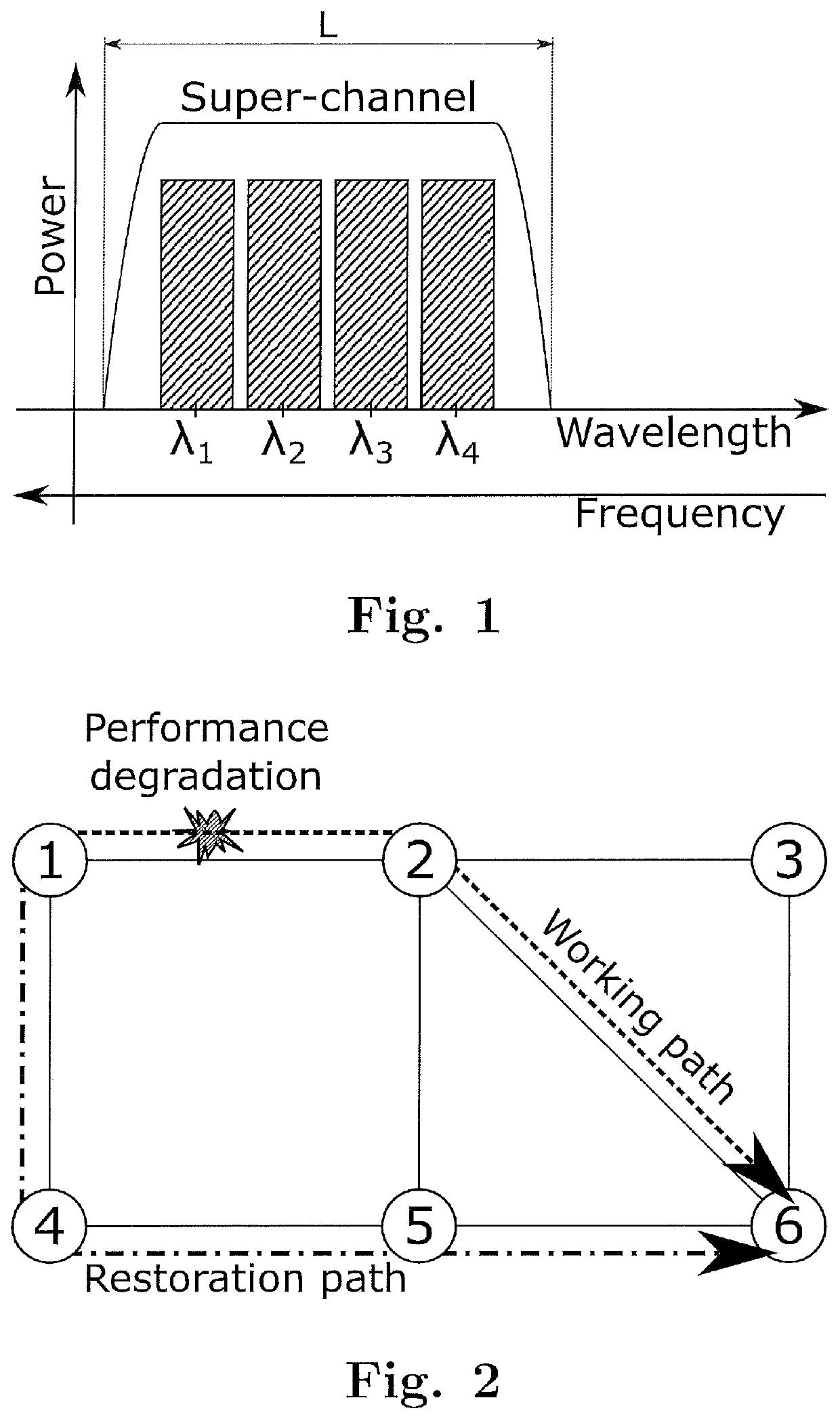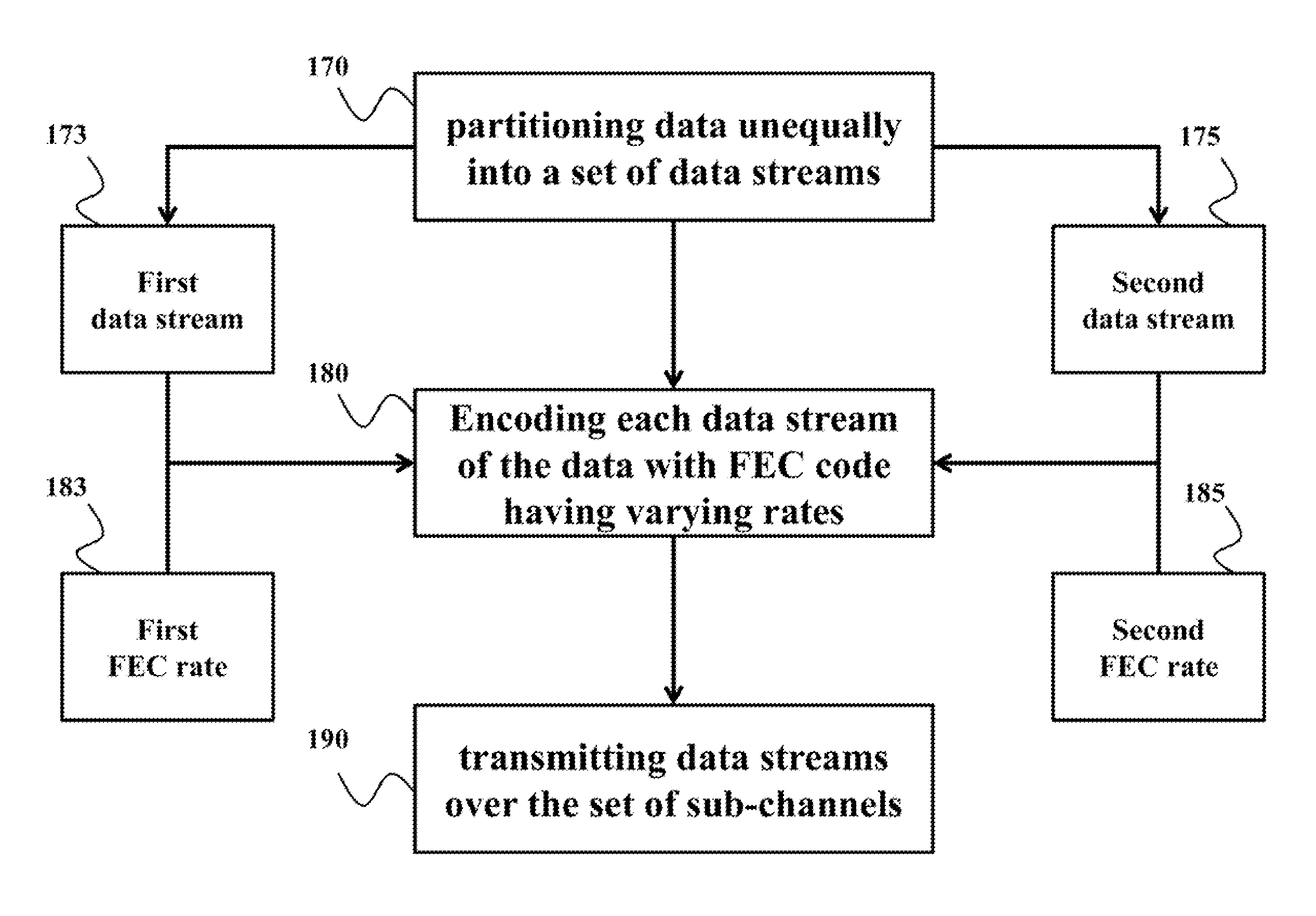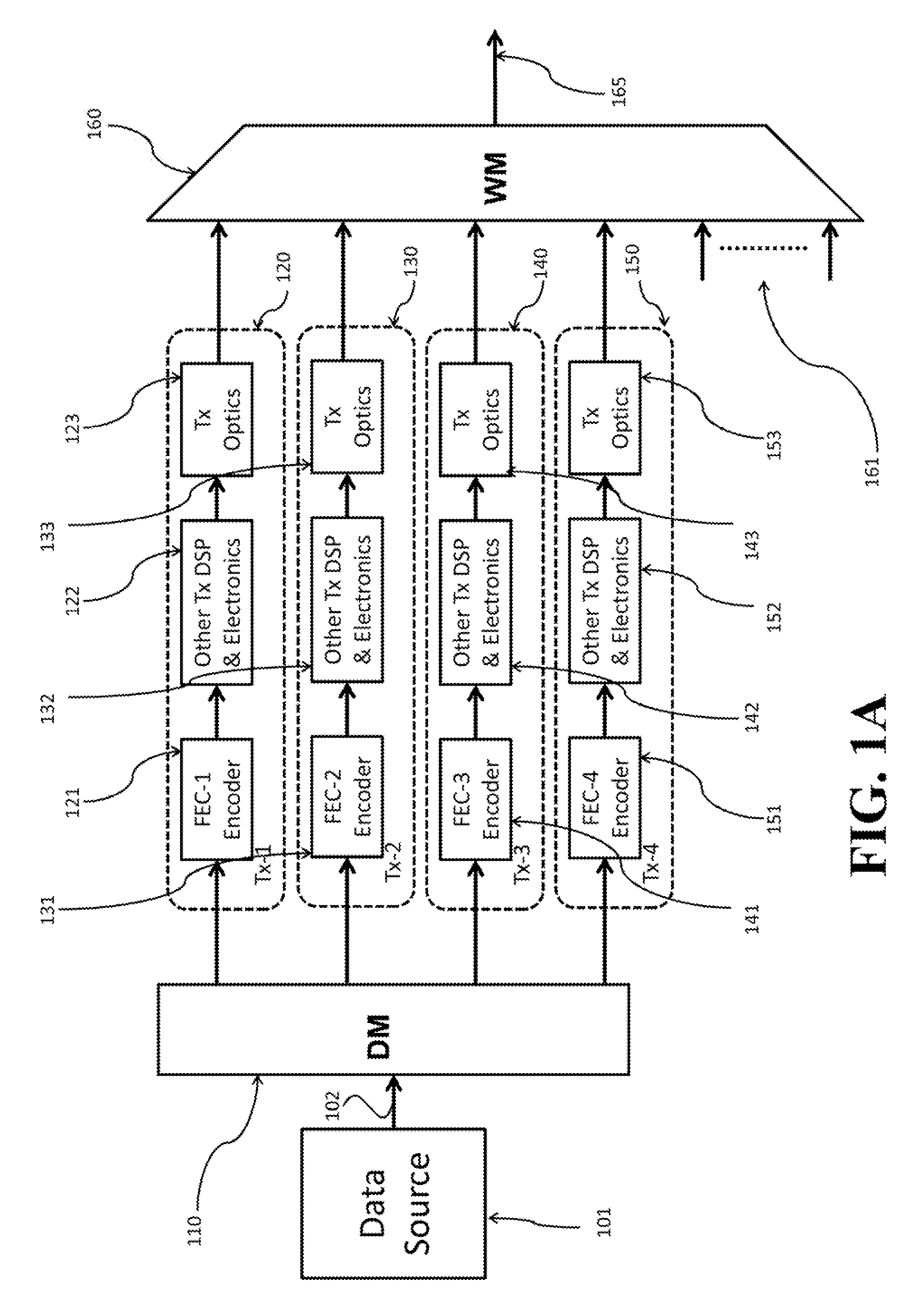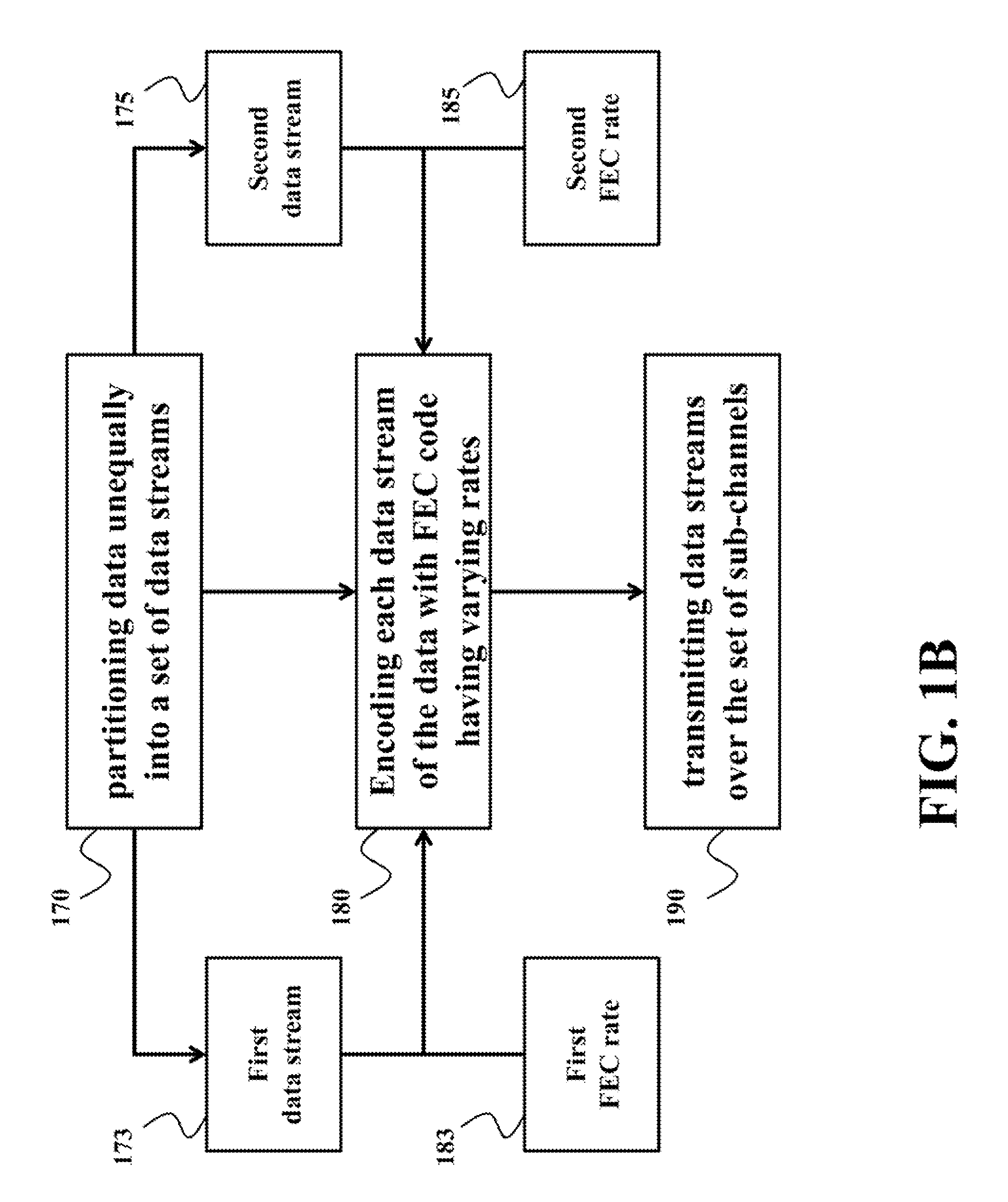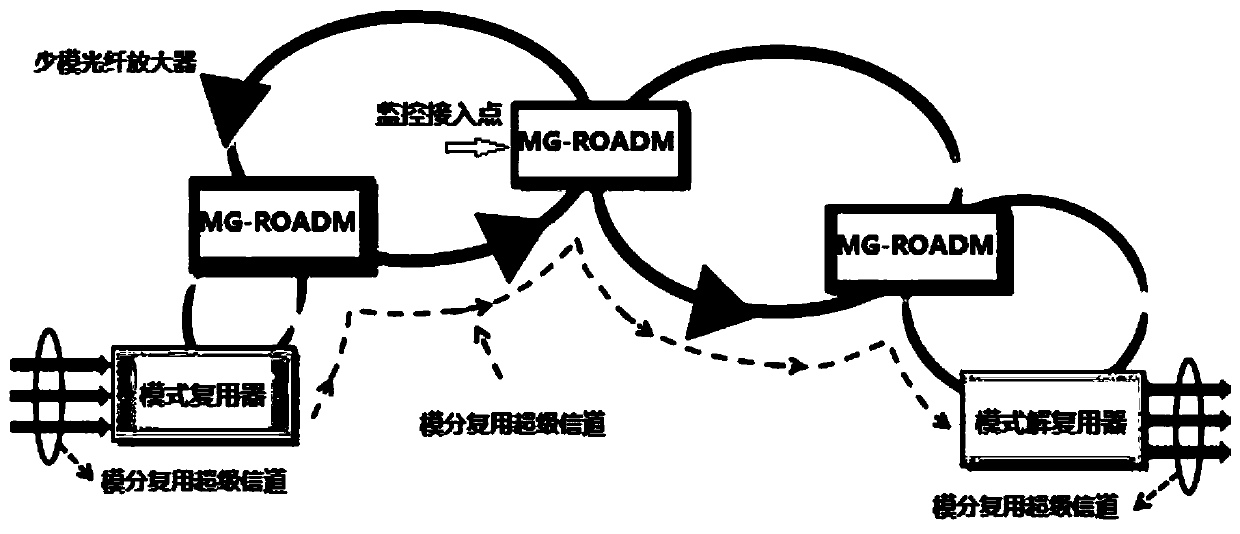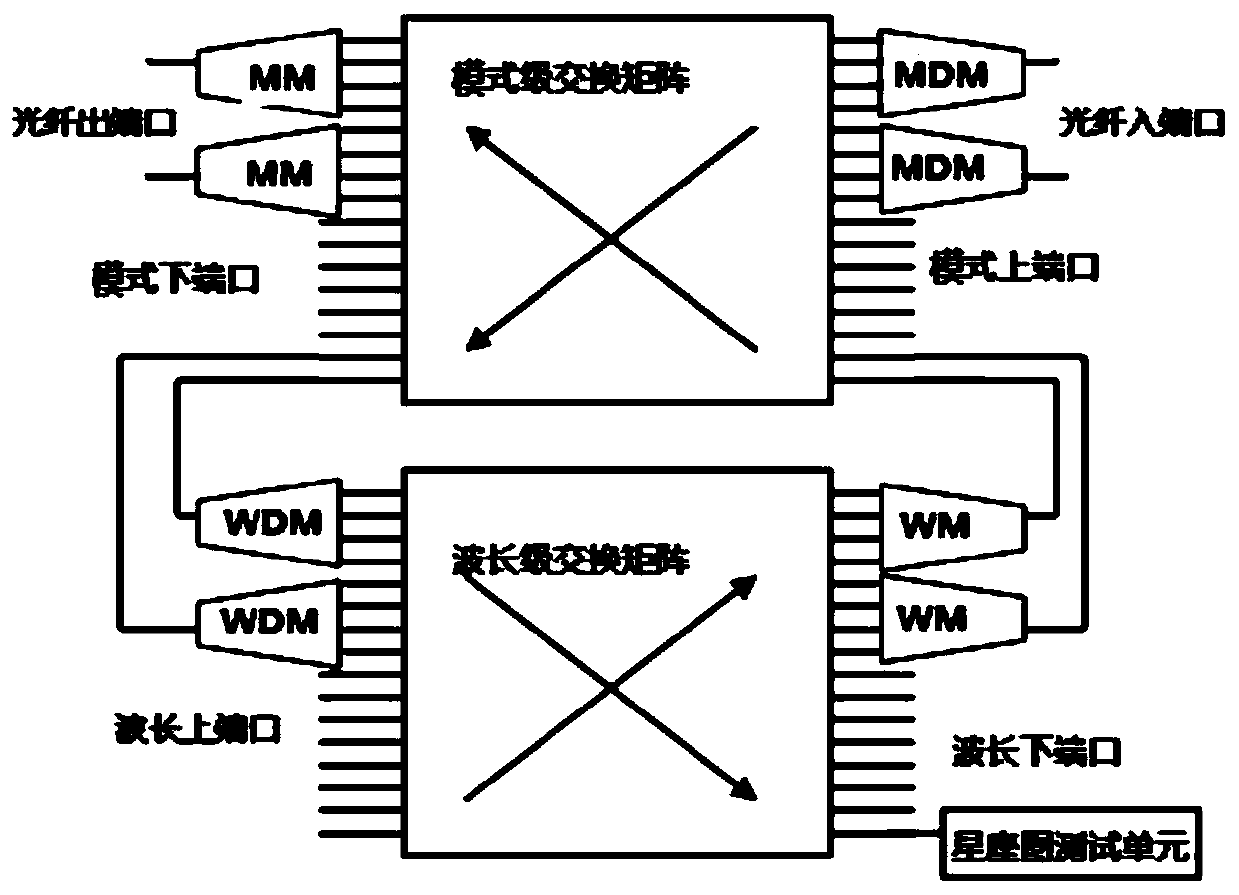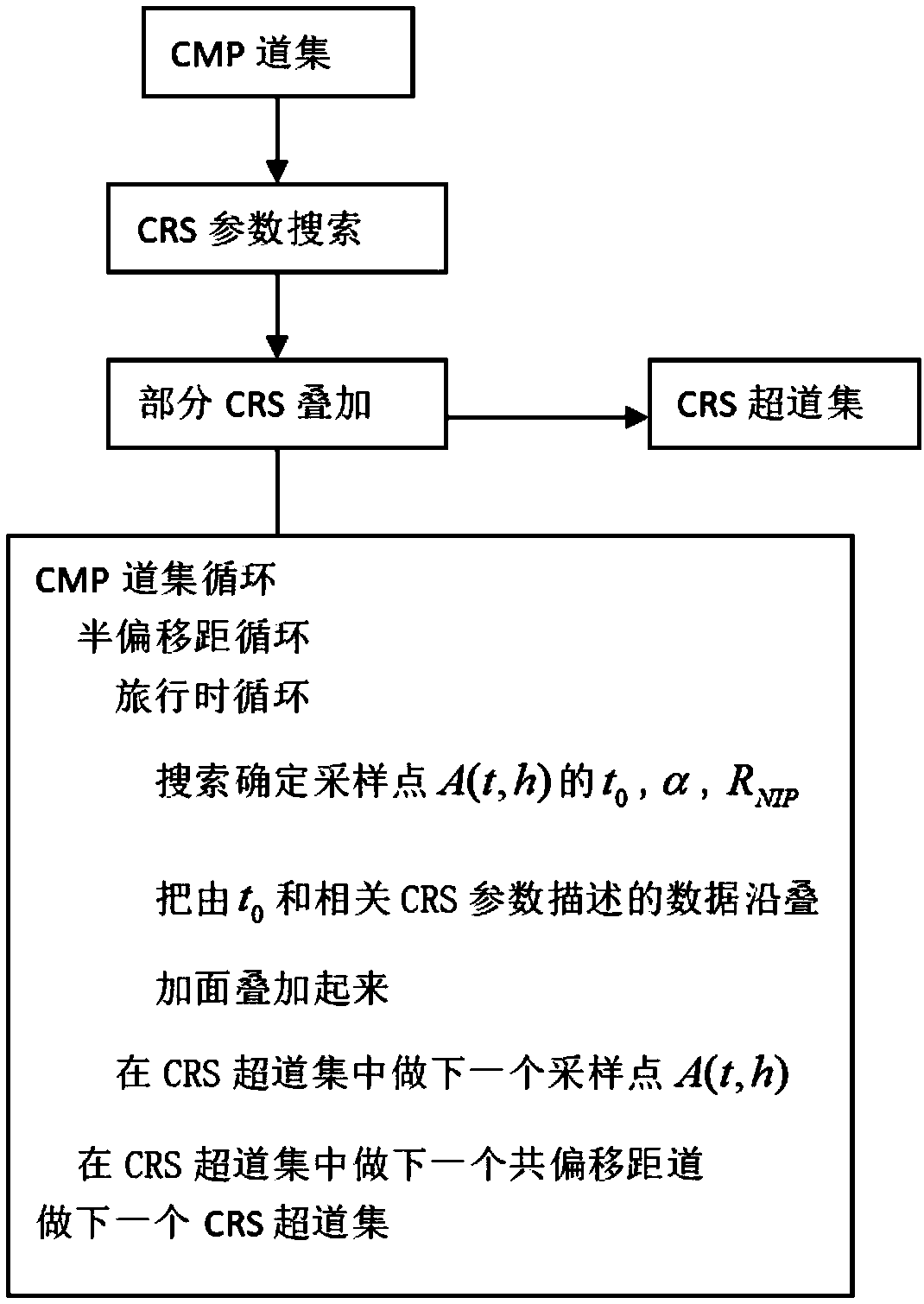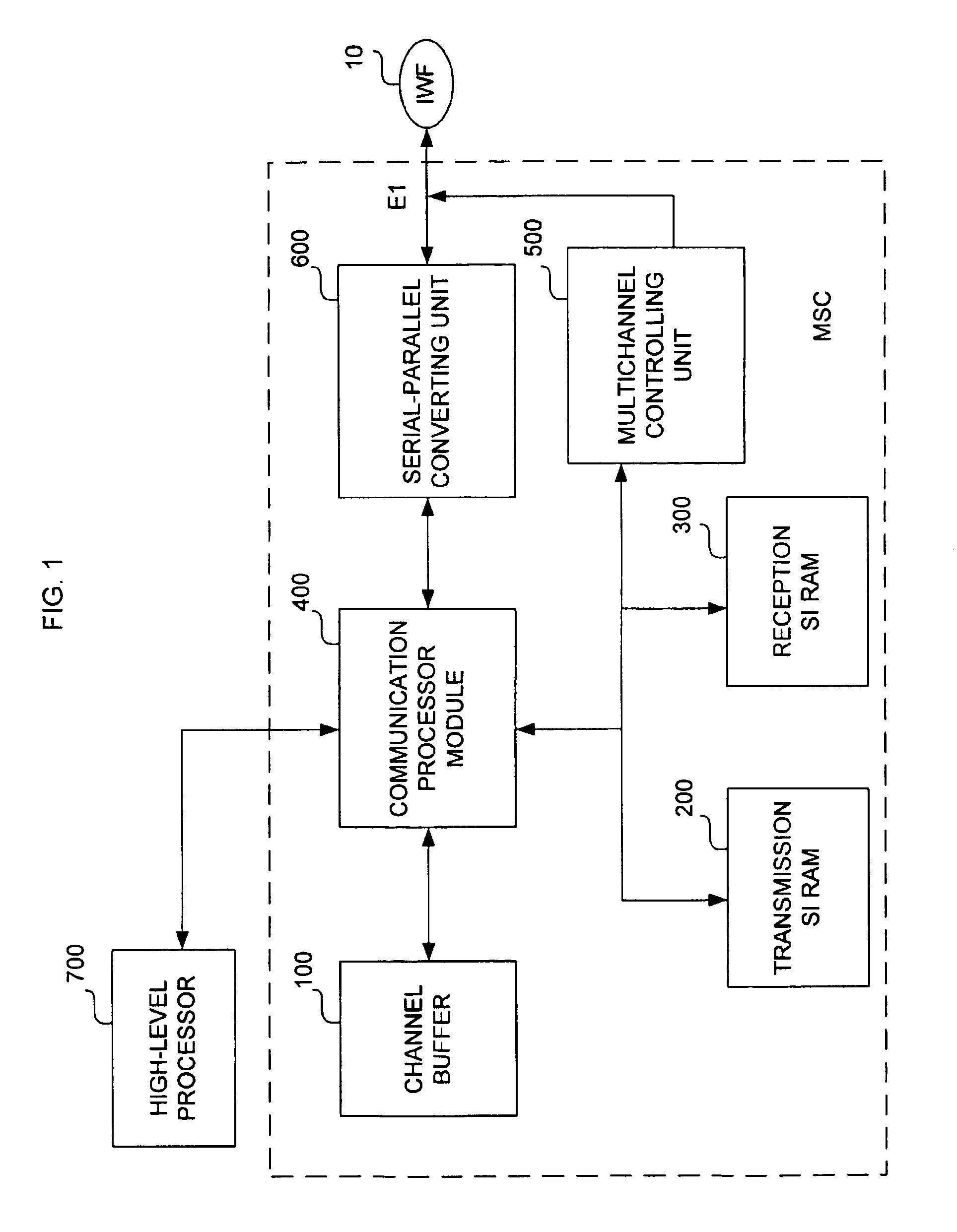Patents
Literature
Hiro is an intelligent assistant for R&D personnel, combined with Patent DNA, to facilitate innovative research.
56 results about "Super-channel" patented technology
Efficacy Topic
Property
Owner
Technical Advancement
Application Domain
Technology Topic
Technology Field Word
Patent Country/Region
Patent Type
Patent Status
Application Year
Inventor
A super-channel is an evolution in Dense Wavelength Division Multiplexing (DWDM) in which multiple, coherent optical carriers are combined to create a unified channel of a higher data rate, and which is brought into service in a single operational cycle.
Multi-Direction Variable Optical Transceiver
ActiveUS20140205286A1Better networkMultiplex system selection arrangementsOptical multiplexTraffic capacitySuper-channel
An optical transceiver including a multi-direction variable transmitter including multiple outputs with different subcarriers being directed to different ones of the outputs to go to different directions in a network, and a multi-direction variable receiver for receiving multiple inputs thereby enabling transmission direction in a network with the transceiver at subcarrier granularity and avoiding entire super-channel granularity and enabling unused subcarriers to be utilized for traffic in other directions or destinations and making switching granularity finer for flexibility in the network.
Owner:NEC CORP
Multiplexer and Modulation Arrangements for Multi-Carrier Optical Modems
ActiveUS20120251119A1Polarisation multiplex systemsWavelength-division multiplex systemsSuper-channelModem device
Consistent with the present disclosure, data, in digital form, is received by a transmit node of an optical communication, and converted to analog signal by a digital-to-analog converter (DAC) to drive a modulator. The modulator, in turn, modulates light at one of a plurality of wavelengths in accordance with the received data forming a plurality of corresponding carriers. The plurality of carriers are then optically combined with a fixed spacing combiner to form a superchannel of a fixed capacity. Accordingly, the number of carriers are selected according to a modulation format and symbol rate to realize the fixed capacity, for example. The superchannel is then transmitted over an optical communication path to a receive node. At the receive node, the superchannel is optically demultiplexed from a plurality of other superchannels. The plurality of carriers are then supplied to a photodetector circuit, which receives additional light at one of the optical signal carrier wavelengths from a local oscillator laser. An analog-to-digital converter (ADC) is provided in the receive node to convert the electrical signals output from the photodetector into digital form. The output from the ADC is then filtered in the electrical domain, such that optical demultiplexing of the carriers is unnecessary.
Owner:INFINERA CORP
Periodic Superchannel Carrier Arrangement for Optical Communication Systems
ActiveUS20120251121A1Polarisation multiplex systemsWavelength-division multiplex systemsMultiplexingSuper-channel
Consistent with the present disclosure, data, in digital form, is received by a transmit node of an optical communication system, is processed and then output to drive a modulator. The modulator, in turn, modulates light at one of a plurality of wavelengths in accordance with the received data, forming a plurality of corresponding carriers. The plurality of wavelengths used for the plurality of carriers are spectrally spaced apart by a common, periodic fixed spacing. The plurality of carriers are optically combined with a fixed spacing combiner to form a superchannel. A plurality of superchannels are generated and then multiplexed together onto an optical communication path and transmitted to a receive node. Each superchannel includes a plurality of carriers, each spectrally separated by the same fixed spacing. The plurality of superchannels are spectrally separated by an amount corresponding to the fixed spacing of the plurality of carriers. At the receive node, the superchannels are optically demultiplexed, and the plurality of carriers of a respective superchannel are then supplied to a photodetector circuit, which receives additional light at one of the optical signal carrier wavelengths from a local oscillator laser. The resultant signals are then processed electronically to separate the individual carriers and output data corresponding to the input data.
Owner:INFINERA CORP
Mitigation of polarization dependent loss in optical multi-carrier/super-channel transmission
ActiveUS9112609B2Polarisation multiplex systemsDistortion/dispersion eliminationSuper-channelCarrier signal
Methods and systems for mitigating effects of polarization dependent loss (PDL) in an optical network transmitting a multi-carrier optical signal comprising a plurality of subcarriers may involve assigning and modifying a state of polarization to each subcarrier prior to transmission. An assigned state of polarization for each subcarrier may be modified for the subcarrier in the digital domain and / or the optical domain. Various specific assignment methods may be used, including individual subcarrier assignment, subcarrier set assignment, arbitrary subcarrier group assignment, random assignment, and / or combinations thereof. The assigned states of polarization may be selected based on a resulting minimum PDL-induced peak-to-peak power variation over a sum of the subcarriers for all orientations of a principal axis of PDL.
Owner:FUJITSU LTD
Multiplexer and modulation arrangements for multi-carrier optical modems
ActiveUS8861977B2Polarisation multiplex systemsWavelength-division multiplex systemsModem deviceSuper-channel
A number of carriers are selected according to a modulation format and symbol rate to realize a superchannel having fixed capacity, for example. At a receive node, the superchannel is optically demultiplexed from a plurality of other superchannels. The plurality of carriers are then supplied to a photodetector circuit, which receives additional light at one of the optical signal carrier wavelengths from a local oscillator laser. An analog-to-digital converter (ADC) is provided in the receive node to convert the electrical signals output from the photodetector into digital form. The output from the ADC is then filtered in the electrical domain, such that optical demultiplexing of the carriers is unnecessary.
Owner:INFINERA CORP
System and methods for malware detection using log analytics for channels and super channels
ActiveUS20160156655A1Memory loss protectionError detection/correctionSuper-channelRelevant information
Log based analysis systems and methods for protecting computers and networks from malicious communications and malware attacks by analyzing log data obtained from client networks having network entities representing business units or customers. The system may further comprise a plurality of client asset machines, each operable to execute a security product associated with a security product vendor and log associated information of the network entities into at least one log file. The log files may be uploaded onto a log-analytics detection platform for analysis using learning algorithms operable to generate a risk factor attribute for at least one entity.
Owner:SECULERT LTD
Variable Rate Optical Transmitter Based on All-Optical OFDM Super-Channel Technology
ActiveUS20130058648A1Automatic controlModulated-carrier systemsTransmission monitoringAutomatic controlSuper-channel
The present invention is directed to a method including determining an appropriate power level for a phase modulator for an optimum number of subcarriers; and applying the determined appropriate power level via a controller to produce the optimum number of subcarriers, wherein the optimum number of subcarriers enables an optical-orthogonal frequency division multiplex O-OFDM based variable rate transmitter with automatic control by a controller to produce an optimum setting based on a required rate.
Owner:NEC CORP
Inter-Channel Interference Management for Optical Super-Channels
ActiveUS20160080087A1Reduce the impactMaximize reliabilityError preventionWavelength-division multiplex systemsMultiplexingData stream
The transmission of data from a transmitter to a receiver over an optical super-channel including a set of sub-channels of different frequencies includes partitioning the data into a set of data streams including one data stream for each sub-channel and partitioning each data stream into a set of sub-streams. Each sub-stream of each data stream is encoded with different forward error correction (FEC) codes to produce a set of encoded sub-streams for each data stream, and the set of encoded sub-streams of each data stream are superimposed with different powers to produce a set of encoded data streams. The set of encoded data streams is multiplexed to produce an optical signal transmitted over the set of sub-channels of the optical super-channel.
Owner:MITSUBISHI ELECTRIC RES LAB INC
Multiplexer and Modulation Arrangements for Multi-Carrier Optical Modems
ActiveUS20120251120A1Polarisation multiplex systemsWavelength-division multiplex systemsModem deviceSuper-channel
Consistent with the present disclosure, data, in digital form, is received by a transmit node of an optical communication system, and converted to an analog signal by a digital-to-analog converter (DAC) to drive a modulator. The modulator, in turn, modulates light at one of a plurality of wavelengths in accordance with the received data forming a plurality of corresponding carriers. The carriers are modulated according to one of a plurality of modulation formats and then optically combined to form a superchannel of a constant maximum capacity, for example. Accordingly, the number of carriers and the bit rate for each carrier remain constant for each modulation format to realize a constant maximum capacity. The superchannel is then transmitted over an optical communication path to a receive node. At the receive node, the superchannel is optically demultiplexed from a plurality of other superchannels. The plurality of carriers of the superchannel are then supplied to a photodetector circuit, which receives additional light at one of the optical signal carrier wavelengths from a local oscillator laser. An analog-to-digital converter (ADC) is provided in the receive node to convert the electrical signals output from the photodetector into digital form. The output from the ADC is then filtered in the electrical domain, such that optical demultiplexing of the carriers is unnecessary.
Owner:INFINERA CORP
Observation system variable-layout design evaluation method and observation system variable-layout design evaluation device based on actual seismic data
ActiveCN104597493AImprove collection effectGood application effectSeismic signal processingGeophoneSuper-channel
The invention relates to an observation system variable-layout design evaluation method and an observation system variable-layout design evaluation device based on actual seismic data. The method comprises the following steps: the shot-geophone distance distribution of each surface element is calculated according to a variable-layout observation system of an obstacle in an exploration area; seismic channel set data representing the features of a target layer of the exploration area is selected from actual seismic data of the exploration area, the selected seismic channel set data forms a model super channel set, and the shot-geophone distance of the super channel set is distributed uniformly; a seismic channel with smallest offset distance is extracted from the model super channel set according to the shot-geophone distance for each surface element to obtain channel set data of the surface element; the channel set data of the surface elements is superimposed to obtain a seismic data body of the exploration area; and a seismic profile or horizontal slice is extracted from the seismic data body to analyze shallow seismic data loss and remedy, thus realizing observation system variable-layout design evaluation.
Owner:BC P INC CHINA NAT PETROLEUM CORP +1
Adaptive Error Correction Code for Optical Super-Channels
ActiveUS20160204899A1Improve performanceWavelength-division multiplex systemsCode conversionComputer hardwareData stream
A method for transmitting data over an optical super-channel partitions the data unequally into a set of data streams for transmission over the set of sub-channels of the super-channel, such that a size of a first data stream for transmission over a first sub-channel is different than a size of a second data stream of the data for transmission over a second sub-channel. The method encodes each data stream of the data with an error correction code (ECC) having different ECC rates to produce a set of encoded data streams and transmits concurrently the set of encoded data streams over the set of sub-channels of the super-channel. Accordingly, the method uses an adaptive ECC for optical super-channels, such that a first ECC rate for encoding the first data stream is different than a second ECC rate for encoding the second data stream.
Owner:MITSUBISHI ELECTRIC RES LAB INC
Adaptively Balanced Detector
ActiveUS20120251118A1Polarisation multiplex systemsWavelength-division multiplex systemsSuper-channelPower flow
Consistent with the present disclosure, a coherent detector is provided that includes an optical hybrid that supplies optical signals including local oscillator light to a balanced detector. The amount of imbalance or “balance error” in the balanced detector is identified by comparing an output of the balanced detector and an output of a photodiode that receives a portion of an input optical signal provided to the optical hybrid. Based on the balance error, electrical signals generated by the balanced detector or the power of optical signals passing through (or output from) the optical hybrid circuit can be adjusted so that the balance error is minimized or reduced to zero. As a result, imbalance associated with the balanced detector is corrected so that unwanted currents and / or related electrical signals are cancelled out or substantially cancelled out. Such unwanted currents and / or related electrical signals are generated in response to noise in the local oscillator light as well as intensity noise associated with non-selected optical signals in a superchannel.
Owner:INFINERA CORP
Method for extracting local oscillating light in Super-channel CO-OFDM system
InactiveCN104378165AReduce extractionAvoid sideband signalsMulti-frequency code systemsElectromagnetic receiversFrequency spectrumSuper-channel
The invention relates to the optical communication technology, in particular to a method for extracting local oscillating light in a Super-channel CO-OFDM system. The local oscillating light is extracted in the Super-channel CO-OFDM system with the method that optical injection locking is combined with an optical phase-locked loop, the complexity of an optical receiver to be used for compensating for frequency offset and phases can be effectively lowered, and the power consumption, the cost and the like of the receiver can be further reduced. According to the method, as photon carriers extracted after processing such as optical injection locking and phase locking is carried out serve as the local oscillating light, the local oscillating light can be kept the same as the signal photon carriers in frequency and phase, the complexity of a digital signal processing algorithm in the coherent optical receiver can be greatly lowered, the power consumption of the digital signal processing algorithm in the coherent optical receiver can be greatly reduced, and the performance advantages, including the receiver sensitivity, the spectral efficiency and the robustness to polarization dispersion, of the CO-OFDM can be better developed. In addition, by means of the method, the CO-OFDM system can have the high operation efficiency, and reduction, caused by the frequency deviation between a local laser apparatus and a transmitting-end laser apparatus, of the coherent receiving efficiency can be effectively reduced.
Owner:UNIV OF ELECTRONICS SCI & TECH OF CHINA
Optical signal-to-noise ratio (OSNR) test method and device
ActiveCN104243019AReliable OSNRTransmission monitoring/testing/fault-measurement systemsSuper-channelSignal-to-noise ratio (imaging)
The invention provides an optical signal-to-noise ratio (OSNR) test method. The method includes: determining the number of subcarriers in multi-subcarrier multiplexing super channels and measuring central wavelength and effective bandwidth of the subcarriers; subjecting each subcarrier to OSNR measurement which includes that the OSNR of the subcarrier is measured in the effective bandwidth at the central wavelength location, and the effective bandwidth is the effective bandwidth acquired during performing the effective bandwidth measurement on the subcarrier; acquiring the multi-subcarrier multiplexing super channels according to the OSNRs of the subcarriers and the number of the subcarriers acquired in measurement. On the basis of the method, the invention further provides an OSNR test device. By the method and the device, the reliable OSNRs of the multi-subcarrier multiplexing super channels can be acquired.
Owner:CHINA ACADEMY OF INFORMATION & COMM
Multiplexer and modulation arrangements for multi-carrier optical modems
ActiveCN102833029AMultiplex system selection arrangementsPolarisation multiplex systemsSuper-channelModem device
Owner:INFINERA CORP
Frame structure and method for wavelength concatenated channel framing
ActiveUS7774493B1Time-division multiplexMultiple digital computer combinationsComputer hardwareSuper-channel
A method, device, and apparatus that provide a means for generating a network frame that provides information related to one or more super-channels for data transmission, which are comprised of one or more sub-channels for data transmission, over which the network frame is transmitted are disclosed.
Owner:ADTRAN NETWORKS SE
Method and apparatus for efficient network utilization using superchannels
ActiveUS20180076920A1Data rateWell formedMultiplex system selection arrangementsWavelength-division multiplex systemsSuper-channelWavelength selective switching
The disclosure relates to technology for constructing an optical network. A central node is selected among a plurality of nodes in the optical network, and each of the nodes is connected to the central node via a set of superchannels, wherein each of the superchannels includes sub-carriers and has a same data rate. The network resources between the central node and each of the plurality of nodes are managed by dynamically allocating the sub-carrier bandwidths to support communication among the plurality of nodes via the superchannels, and wavelength selective switching is performed among the superchannels at the central node.
Owner:FUTUREWEI TECH INC
Photonic cross-connect with reconfigurable add-drop-functionality
ActiveUS20150365186A1Multiplex system selection arrangementsWavelength-division multiplex systemsSuper-channelCross connection
A photonic cross-connect arrangement is presented which is able to cope with the transmission of super-channels, wherein complete super-channels are dropped and added to change a direction of transport. At least a cyclic filter is used in a drop-branch of a cross-connect for dividing a super-channel into sub-channels and / or at least a further cyclic filter is used in an add-branch to configure a super-channel.
Owner:XIEON NETWORKS SARL
Multi-direction variable optical transceiver
ActiveUS9124369B2Better networkMultiplex system selection arrangementsWavelength-division multiplex systemsSuper-channelTransceiver
An optical transceiver including a multi-direction variable transmitter including multiple outputs with different subcarriers being directed to different ones of the outputs to go to different directions in a network, and a multi-direction variable receiver for receiving multiple inputs thereby enabling transmission direction in a network with the transceiver at subcarrier granularity and avoiding entire super-channel granularity and enabling unused subcarriers to be utilized for traffic in other directions or destinations and making switching granularity finer for flexibility in the network.
Owner:NEC CORP
Optical transport network with improved signal loading
InactiveUS20180234199A1Wavelength-division multiplex systemsElectromagnetic network arrangementsSuper-channelOperating point
Owner:FUJITSU LTD
Main optical channel power test method and apparatus
The invention provides a main optical channel power test method. The method includes the following steps that: WDM optical signals to be tested are scanned, so that the central wavelengths of optical signals in the WDM optical signals can be obtained; effective spectral widths occupied by the optical signals can be determined according to the central wavelengths of the optical signals in the WDM optical signals; and the main optical channel power of the WDM optical signals is tested according to the central wavelengths of the optical signals in the WDM optical signals and the determined effective spectral widths. Based on the same conception as above, the invention also provides a main optical channel power test apparatus. With the main optical channel power test apparatus adopted, main optical channel power measurement of multi-sub-carrier multiplexed super channel spectra of flexible spectrum intervals can be performed flexibly.
Owner:CHINA ACADEMY OF INFORMATION & COMM
Subcarrier diversity in optical communication systems
ActiveUS20200244388A1Intuitive effectLow transfer rateWavelength-division multiplex systemsSuper-channelData stream
Disclosed herein is a method of transmitting a data stream from a first location to a second location through an optical network, as well as a corresponding performance monitoring unit, a transmitting arrangement and a receiving arrangement. The method comprises the steps of transmitting said data stream from said first location to said second location along a working path, wherein said data stream is transmitted in the form of a super channel comprising a number of n wavelengths within a predefined reserved wavelength range, monitoring the performance of the transmission based on the super channel signal received at said second location, and in case the performance is observed to drop below a predetermined performance threshold, unburdening the super channel from a part of said data stream while maintaining the reserved wavelength range for said super channel, by redirecting said part of the data stream for transmittal along at least one restoration path connecting said first and second locations, and transmitting the remainder of said data stream within the super channel on a number of wavelengths that is less than n, and / or with a reduced transmission rate for at least some of the wavelengths in said super channel.
Owner:XIEON NETWORKS SARL
Adaptive error correction code for optical super-channels
ActiveUS9584256B2Improve performanceWavelength-division multiplex systemsCode conversionComputer hardwareData stream
A method for transmitting data over an optical super-channel partitions the data unequally into a set of data streams for transmission over the set of sub-channels of the super-channel, such that a size of a first data stream for transmission over a first sub-channel is different than a size of a second data stream of the data for transmission over a second sub-channel. The method encodes each data stream of the data with an error correction code (ECC) having different ECC rates to produce a set of encoded data streams and transmits concurrently the set of encoded data streams over the set of sub-channels of the super-channel. Accordingly, the method uses an adaptive ECC for optical super-channels, such that a first ECC rate for encoding the first data stream is different than a second ECC rate for encoding the second data stream.
Owner:MITSUBISHI ELECTRIC RES LAB INC
MG-ROADM optical node structure and an optical communication signal performance monitoring method in a mode division multiplexing super channel reconfigurable optical network
ActiveCN109905173ALarge communication capacityIncreased complexityMultiplex system selection arrangementsFibre transmissionSuper-channelLevel structure
The invention discloses an MG-ROADM optical node structure and an optical communication signal performance monitoring method in a mode division multiplexing super channel reconfigurable optical network. The optical node structure comprises a second-level structured optical node and a third-level structured optical node and has all-optical multi-granularity service exchange and uplink and downlinkchannels, all-optical multi-granularity services refer to optical fiber-level, mode-level and wavelength-level granularity services, and the optical nodes of the two structures further have the functions of all-optical multi-granularity traffic dispersion, all-optical multi-granularity service convergence and mode conversion. According to the invention, the demultiplexing structure in the opticalnode structure is skillfully utilized; the constellation diagram test unit or the eye diagram test unit is directly used for analyzing the performance of the optical signal; Degradation reasons of thechannel signal are known by investigating characteristics of the eye diagram and the constellation diagram, various optical performance degradation can be identified, and the method is suitable for the dynamic routing technology of the next generation of mode division multiplexing super channel optical network, and does not need a historical path of the monitored optical signal. According to themethod, monitoring is carried out on a physical layer, and an optical data signal protocol and a code rate can be transparent.
Owner:NANJING UNIV OF POSTS & TELECOMM
Adaptively Balanced Detector
ActiveUS8774646B2Polarisation multiplex systemsWavelength-division multiplex systemsSuper-channelPower flow
Consistent with the present disclosure, a coherent detector is provided that includes an optical hybrid that supplies optical signals including local oscillator light to a balanced detector. The amount of imbalance or “balance error” in the balanced detector is identified by comparing an output of the balanced detector and an output of a photodiode that receives a portion of an input optical signal provided to the optical hybrid. Based on the balance error, electrical signals generated by the balanced detector or the power of optical signals passing through (or output from) the optical hybrid circuit can be adjusted so that the balance error is minimized or reduced to zero. As a result, imbalance associated with the balanced detector is corrected so that unwanted currents and / or related electrical signals are cancelled out or substantially cancelled out. Such unwanted currents and / or related electrical signals are generated in response to noise in the local oscillator light as well as intensity noise associated with non-selected optical signals in a superchannel.
Owner:INFINERA CORP
System and method for providing a super channel in a multi-band multi-protocol hybrid wired/wireless network
InactiveCN1997979AMultiple digital computer combinationsElectric digital data processingMulti bandSuper-channel
Messages from a physical layer of each communication band and communication channel associated with each protocol utilized in a multi-band, multi-protocol network may be aggregated into a single multi-protocol layer called, for example, a super channel layer. An optimal communication path may be identified from among the communication bands and / or communication channels based on information borne by the single multi-protocol layer. A communication session may be established via optimal communication path. The communication path may include different channels within a single communication bands, and / or channels selected from different communication bands. In this regard, channels from the same or different communication bands may be combined to provide an optimal communication path. The single multi-protocol layer may be characterized as a sublayer located within the data link layer. Accordingly, the single multi-protocol layer may be located above a MAC layer, both of which are part of the data link layer.
Owner:AVAGO TECH INT SALES PTE LTD
Seismic wave imaging method based on particle swarm optimization CRS (Common Reflection Surface) super gather
InactiveCN109581488AImprove signal-to-noise ratioIncrease reachSeismic signal processingSuper-channelImaging quality
The invention belongs to the field of seismic data processing for oil-gas exploration, and particularly relates to a seismic wave imaging method based on particle swarm optimization CRS (Common Reflection Surface) super gather. The method comprises the following steps of: step 1, optimizing distributed CRS superposition on pre-stack data, and updating three wave field parameters of a CRS superimposed surface of the superimposed final output by using a particle swarm optimization algorithm; step 2, performing curvature and inclination correction on the pre-stack data under the guidance of an optimal value of the CRS wave field parameter; step 3, inputting the optimal value of the CRS wave field parameters as a standard parameter, performing partial CRS superposition on the pre-stack data, and outputting a CRS optimized super-channel set; and step 4, performing CRS superposition and time offset on the output CRS optimized super gather to obtain an optimal CRS superposition profile and anoffset profile. The seismic wave imaging method based on the particle swarm optimization CRS super gather can effectively solve a problem that the inclination and curvature correction of the data arenot performed in the CRS superposition process in the prior art, so that the influence of the curvature and the inclination angle is amplified together with effective signals in a superposition process, thereby seriously affecting the imaging quality.
Owner:CHINA UNIV OF PETROLEUM (EAST CHINA)
Method and apparatus for efficient network utilization using superchannels
ActiveUS9941992B2Multiplex system selection arrangementsWavelength-division multiplex systemsSuper-channelWavelength selective switching
The disclosure relates to technology for constructing an optical network. A central node is selected among a plurality of nodes in the optical network, and each of the nodes is connected to the central node via a set of superchannels, wherein each of the superchannels includes sub-carriers and has a same data rate. The network resources between the central node and each of the plurality of nodes are managed by dynamically allocating the sub-carrier bandwidths to support communication among the plurality of nodes via the superchannels, and wavelength selective switching is performed among the superchannels at the central node.
Owner:FUTUREWEI TECH INC
Residual static correction method and device
ActiveCN109471173AImprove computing efficiencyReduce running timeSeismic signal processingChannel dataSuper-channel
The invention provides a residual static correction method and device. The method includes the steps that according to obtained super-channel data, shot point list data and demodulator probe list dataare generated, wherein the super-channel data includes seismic channel data of a combination of seismic waveforms within the same time window; shot point super-channel data in the shot point list data is distributed into one or more first task processing threads respectively, and the first task processing threads are used for working out a residual static correction value corresponding to a shotpoint according to the distributed shot point super-channel data; demodulator probe super-channel data in the demodulator probe list data is distributed into one or more second task processing threadsrespectively, and the second task processing threads are used for working out a residual static correction value corresponding to a demodulator probe according to the distributed demodulator probe super-channel data. According to all embodiments of the residual static correction method and device, resources of a large-scale computer cluster are fully utilized, the run time for super-channel disintegration operation on mass data is shortened substantially, and the calculating efficiency of the residual static correction value is improved.
Owner:BC P INC CHINA NAT PETROLEUM CORP +1
Apparatus and method for allocating channel between MSC and IWF unit in CDMA mobile communication system
A device and method are provided for allocating an E1 channel between a mobile switching center (“MSC”) and an interworking function (“IWF ”) unit in a CDMA mobile communication system are provided. The method results in an E1 super channel being variably allocated to support both IS-95A service for low speed calls and IS95B service for high speed calls.
Owner:USRCOM KOREA
Features
- R&D
- Intellectual Property
- Life Sciences
- Materials
- Tech Scout
Why Patsnap Eureka
- Unparalleled Data Quality
- Higher Quality Content
- 60% Fewer Hallucinations
Social media
Patsnap Eureka Blog
Learn More Browse by: Latest US Patents, China's latest patents, Technical Efficacy Thesaurus, Application Domain, Technology Topic, Popular Technical Reports.
© 2025 PatSnap. All rights reserved.Legal|Privacy policy|Modern Slavery Act Transparency Statement|Sitemap|About US| Contact US: help@patsnap.com
